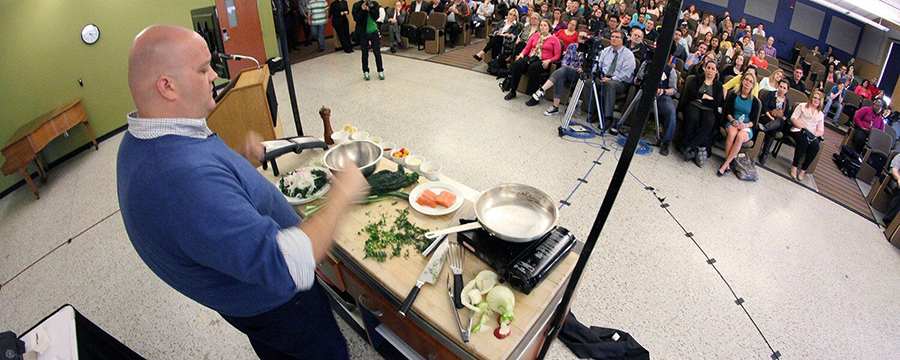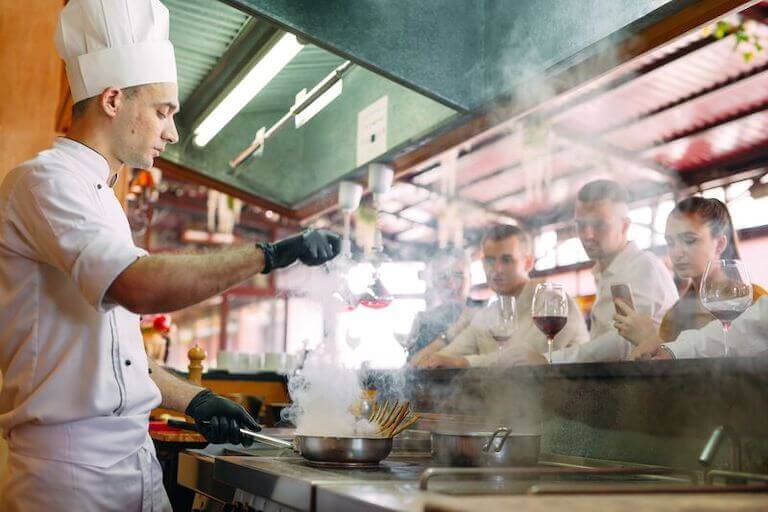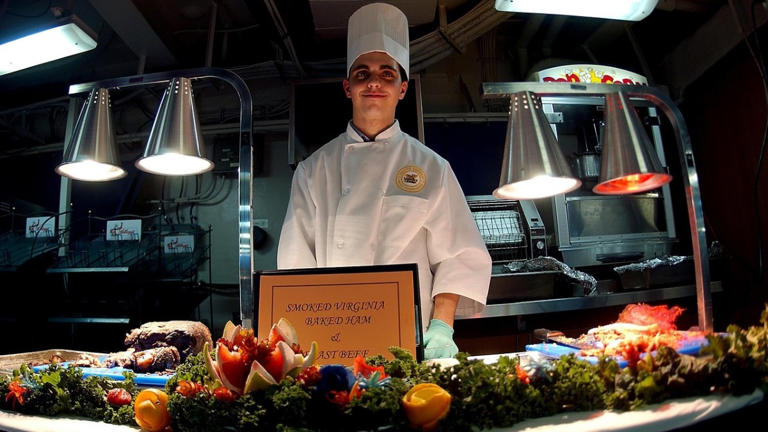The magazine of Glion Institute of Higher Education

Careers in hospitality and tourism: Job list of opportunities for learning and travel

HOSPITALITY UNCOVERED
In this article

World-class hospitality qualifications
Download a brochure and see for yourself
The hospitality and tourism industry is booming thanks to accessible international travel and consumers’ enthusiasm for discovering new places.
Continuing growth in the industry means there is an enticing range of career paths in hospitality and tourism you can consider when deciding on your future, such as event manager, luxury manager, marketing manager, and more.
If you’re curious about what type of role might be best for you, there are plenty of options that combine exciting opportunities for personal development and working around the world.
In this article, we’ll go over the different hospitality and tourism career pathways you could aim towards. We’ll also discuss what the different roles entail and how you can gain the skills and knowledge to succeed in hospitality and tourism.
What is a hospitality and tourism career?
Career opportunities in the hospitality and tourism industry include a wide range of roles and responsibilities. The hospitality field revolves around providing exceptional experiences for guests and travelers.
While the stereotype may portray hospitality as simply serving drinks or waiting tables, the reality is far more varied. Hospitality is all about providing services and amenities to guests, ensuring their comfort, satisfaction, and enjoyment during their stay. This includes accommodations such as hotels, resorts, and vacation rentals, as well as food and beverage services, event planning, entertainment, and recreational activities.
Tourism involves the travel activities of individuals and groups for leisure, business, or other purposes. It encompasses everything from sightseeing and adventure tourism to cultural exchanges and eco-tourism.
A career in hospitality and tourism can take many forms, depending on one’s interests, skills, and qualifications. You can find everything from entry-level roles to managerial and executive careers, which are ideal roles for a lot of people.
Why pursue a career in the industry?
With tourism and hospitality booming there are more reasons than ever before to consider a career path in this rewarding sector.
Hospitality venues are keen to employ skilled and qualified individuals who can help their businesses thrive. The industry itself can be an exciting and endlessly interesting area to work in.
In this field, you’ll get to work with people from all over the world. You’ll also be able to work in a range of appealing locations since hospitality is truly a global industry. It’s also a great option for people who like to challenge themselves to continuously improve.
Find your path to success: hospitality and tourism jobs list
There are plenty of different employment opportunities in tourism and the hospitality industry, meaning that there are roles that suit everyone. Explore the wide array of opportunities available in this exciting industry as we look at a list of careers in hospitality and tourism, each offering pathways to success and fulfillment.
Hotel operations
This is a catch-all term that encompasses the various departments and functions within a hotel that work together to ensure the smooth and efficient running of the establishment. From front-of-house services that directly interact with guests to back-of-house operations that support the overall infrastructure, hotel operations are essential for delivering exceptional guest experiences.
What different hotel operations jobs are there?
Hotel operations roles include everything that makes a hotel run smoothly. These include:
- Front desk agent/receptionist
- Front of house manager
- Housekeeping
- Food and beverage service
- Food and beverage management
- Revenue management
- Sales and marketing
- Engineering and maintenance management
- General manager
Every department will have a hotel management role associated with it, such as the front of house manager overseeing all front desk agents and receptionists. At the very top is the general manager or executive manager, who ensures that all these different departments run smoothly together.

What are the different departments in a hotel?
There are a range of different departments in a hotel, including:
- Front of house
- Back of house and housekeeping
- Maintenance
- Event management
- Food and beverage services
- Guest experience
Hotels also need general managers who handle the overall operations of all these departments.
What skills are required to work in hotel operations?
To work in hotel operations, you should work on building skills such as:
- Time management
- Team leadership
- Organization
- Analytical skills
- Communication
These useful transferable skills will set you up well for a hospitality and tourism career and in other areas too.
How can I start a career in hotel management?
There are two main routes to working in hotel management. You can either start working your way up from entry-level roles via other careers in the hotel industry or you can study for a hospitality degree .
Salaries in Hotel operations
Working in hotel operations can be lucrative if you aim for a hospitality management career. Some of the top salaries are:
- Assistant hotel manager: $64,993
- Hotel general manager: $118,000
- Hotel finance director: $195,241
- Housekeeping manager: $62,601
Travel and tourism
Unlike hospitality, which focuses on providing accommodation, food, and other services to guests, travel and tourism encompass a broader spectrum of experiences and activities beyond the confines of a hotel or resort. While hospitality is an integral part of the travel and tourism industry, the latter extends to include transportation, attractions, tour operators, travel agencies, and destination management organizations.
List of professions in the tourism industry
There are also a wide range of travel and tourism industry jobs, such as:
- Travel agency management
- Tour guide positions
- Event planning and coordination
- Transportation and logistics in the tourism industry
- Adventure and eco-tourism careers
- Destination marketing
- Cruise ship management
- Tourism research and analysis
These will have many of the same requirements as hotel roles. However, they can lead to working in varied environments, especially if you work in luxury management , which focuses on high-end services.
Salaries in travel and tourism
Choosing these careers in tourism and travel can lead to high salaries, such as:
- Cruise ship director: $64,267
- Travel agent: $59,263
- Destination marketer $108,782
- Tourism manager: $76,729
Restaurant and culinary services
This sector of the hospitality industry focuses on providing food and beverage services to customers, offering a diverse array of culinary experiences tailored to meet varying tastes, preferences, and occasions. From the ambiance and presentation to the quality and taste of the food, restaurant and culinary services play a pivotal role in creating memorable dining experiences for patrons.
Interesting roles in the restaurant and culinary services
Hospitality careers also include food and beverage services work, which includes:
- Restaurant management positions
- Bar managers
- Culinary arts and chef careers
- Front-of-house and back-of-house staff for restaurants
- Sommeliers and beverage professionals
- Catering and event management
Salaries in the restaurant and culinary services
If you are looking at culinary job opportunities in the tourism and hospitality industry, you could expect salaries such as:
- Restaurant manager: $58,442
- Bar manager: $76,586
- Catering manager: $53,566
- Head chef: $95,100
- Sommelier: $63,788
What skills are required to work in restaurant management?
As well as the management skills you’d need for any of these hospitality careers, you’ll also be expected to have culinary experience for a role in restaurant management. You could gain this either through specialized study or by working in a professional kitchen environment, a bar or with a catering company. The skills you will need include:
- Customer service
- Multi tasking
- Organizational skills
What is the role of a sommelier?
A sommelier is a wine expert. They are usually responsible for choosing and updating a venue’s wine list. They’ll also work with chefs to make sure dishes have suitable wine pairings and they can often give advice to customers on wines that enhance their menu selections.
Hospitality marketing and sales
This industry encompasses a range of activities, including market research, advertising, branding, digital marketing, sales campaigns, and customer relationship management. The goal of hospitality marketing and sales is to identify target markets, communicate the value proposition of hospitality offerings, and drive bookings and reservations through effective promotional strategies and sales efforts.
Roles to consider in hospitality marketing and sales jobs
amriphoto/E+ via Getty Images
Another career option in hospitality is to work in marketing and sales. This can mean being responsible for:
- Sales and revenue management
- Digital marketing strategies for hotels and travel companies
- Branding and public relations
- Customer service and guest relations
How can I pursue a career in hospitality marketing?
For one of these hospitality careers, you will need a good knowledge of both the hospitality field and marketing. You can learn the skills you need from a college or hospitality school in Switzerland to give you the best chances of success.
What skills are essential for a sales manager in the hospitality industry?
Vital skills for a marketing or sales job in hospitality and tourism, such as marketing manager, include:
- Project management
- Data analysis
Salaries in hospitality marketing and sales
Sales and marketing roles often offer salaries in the higher bands of hospitality, such as:
- Hotel sales manager: $119,726
- Director of sales: $195,525
- Marketing manager: $134,424
- Sales strategy analyst: $63,585
Event planning and management
These roles involve the meticulous coordination and execution of various events, ranging from corporate conferences and weddings to festivals and special occasions. The responsibilities include venue selection, logistics planning, budget management, vendor coordination, and on-site supervision. Event planners and managers work closely with clients to understand their objectives, preferences, and expectations, tailoring each event to meet specific needs and create memorable experiences for attendees.
Careers in event planning and management
There are plenty of career opportunities in event hospitality, including:
- Wedding planner
- Corporate event planner
- Event manager
- Event designer
- Event marketing specialist
What skills do I need for event planning?
In order to be successful in the field of event management and planning, you will need to build skills such as:
- Problem solving
Event management salaries
Salaries in event management often depend on which kind of events you plan, and at what venues. As a rough guide, you could earn:
- Wedding planner: $39,465
- Event planner: $63,154
- Corporate event planner: $74,119
- Event manager: $111,710
- Event marketing: $188,417
Learn more about Hospitality Careers

Hospitality Careers
Guide to career paths in hospitality

Your career guide: hospitality and tourism management jobs
Hospitality and tourism careers: how to get started.

What’s the most international career path?
Transitioning into a career in hospitality and tourism.
If you are looking to start your career in the hospitality and tourism professions, the important steps are:
- Education and training to get you the skills and qualifications needed for hospitality employment prospects
- Learning transferable skills, such as those listed in this article, to help you in whatever hospitality career you move into
- Networking and making industry connections to help you find job opportunities in tourism and hospitality
- Doing a hospitality internship or apprenticeship to give you real-world experience
What qualifications do I need to pursue a career in hospitality and tourism?
The best qualifications for hospitality careers are specialist hospitality certificates.
Whether you’re thinking about a bachelor’s degree, a diploma or an advanced qualification, these courses will give you the experience and skills necessary to compete for the most sought-after careers in the industry.
If you are looking at a career as a restaurant manager, you should also look for some culinary qualifications.
If you’re looking at degree options, you should aim to choose a course that includes internships. These will provide vital on-the-job training, as well as giving you a chance to network with professionals who are already established.
What are the job prospects and growth potential in the industry?
The hospitality and tourism industries have huge potential for growth due to the demand for quality travel experiences from a global customer base.
This means there are many opportunities for career advancement, especially in luxury management and other high-end hospitality sectors.
Once established in hospitality and tourism, there are also plenty of options to either specialize in area-specific management roles or to aim for general management or executive management roles.
All of these jobs in hospitality will have their own challenges and benefits.
What skills are important for success in hospitality and tourism?
There are many skills you can develop to improve your prospects in the hospitality business . Some of those you should work on consolidating include:
- Communication, both written and verbal
- Time management skills
- Team leadership skills
- Analytical and data handling skills
All of these are transferable or soft skills, which you can use in any job role. You’ll also need to learn specific skills relating to the role you want.
For example, if you want to work in restaurant management, you should aim to build culinary skills alongside those listed above.
If you want to work in sales management, you should aim to develop skills in finance and marketing.
Why hospitality and tourism careers?
Working in hospitality and tourism can be a great career for people who want to challenge themselves, travel, be constantly learning and work in a truly global enterprise.
The sector is experiencing healthy growth and consumer enthusiasm for travel and new experiences is not likely to diminish. You can expect rewarding career prospects with the possibility of advancement.
There are roles to suit all talents, including front of house, food and beverage management, hotel manager, general manager and lots more.
If you want to embrace any of the roles on our hospitality job list, the most efficient route is to get a world-recognized hospitality degree that ensures you gain the skills and knowledge to succeed.
If you want to pursue any of these hospitality careers , from hotel general manager to becoming an event planner , getting a quality education can be the first and most essential step.
Photo credits Main image: Thomas Barwick/DigitalVision via Getty Images

Setting the standard in hospitality degrees
Our world-leading hospitality bachelor’s degree is an intensive mix of developing skills and making priceless connections that mean access to roles at the highest levels of the hospitality industry.
Discover more great Glion content

LISTENING TO LEADERS
Listening to Leaders of Tomorrow #16 – WingChiu Michelle Sze

LIVING WELL
What are ‘bespoke mental health centers’?

Shipping forecast: future looks bright for alumni duo and their sustainable container resort

BUSINESS OF LUXURY
Monteverdi: the story of Switzerland’s last luxury carmaker

World’s best luxury destinations – #2 Zimbabwe

How young talent Stephane made the connection with Four Seasons

Cook with Stéphane Décotterd #10 – oxtail cannelloni & mushroom cream

Hospitality skills to build the perfect resume

In the market: how Alex Slors brings Master’s students closer to the real estate action

Making our voice heard at Hong Kong luxury summit

Listening to Leaders of Tomorrow #15 – Gonzalo Oviedo

Listening to Leaders of Tomorrow #14 – Leen Yaser A Awan
Welcome to glion..
This site uses cookies. Some are used for statistical purposes and others are set up by third party services. By clicking ‘Accept all’, you accept the use of cookies
Privacy Overview

Top 10 hospitality jobs and who’s hiring
Need work in the hospitality field? Get your foot in the door with this guide to top hospitality jobs and who’s offering them.
Are you a hospitality major looking for a career in the industry? Or maybe you’re a recent or upcoming graduate exploring your job options.
From guest services to special event coordinators, we’ve got plenty of exciting possibilities to explore. And we’ve included a list of companies actively hiring on Handshake.
Take a look, get inspired, and find the career option right for you!
Is hospitality a good career path for you?
A career in hospitality is a great way to combine your passions for customer service, hospitality, and travel. To succeed in the sector, you may need:
- Excellent communication skills
- The ability to multitask
- A great attitude and the drive to go above and beyond for customers
- A high level of organizational skills
- The ability to collaborate with other industry professionals
- Problem-solving skills
Plus, with 1.9 million new jobs expected in hospitality over the next 10 years, there’s no shortage of opportunities for those with the right skill set!
Best degrees for hospitality jobs
Here are some of the best degrees for working in the hospitality industry:
- Hospitality management . This degree can provide comprehensive knowledge of the hospitality industry, preparing you for roles like hotel general manager, guest services manager, and conference services manager.
- Business administration. A degree in business administration can help you develop management, marketing, and finance skills, making you an asset in roles like hotel manager, assistant general manager, and operations manager.
- Culinary arts. A degree in culinary arts can prepare you for roles in food and beverage management, such as executive chef, sous chef, and restaurant manager.
- Event management. This degree can provide the skills to plan and coordinate events, making you a valuable asset as an event planner, event coordinator, or meeting planner.
- Tourism and travel management. A tourism and travel management degree can prepare you for roles like a tour guide, destination manager, travel agent, and tour operations manager.
Industries where you can build a hospitality career
While the hospitality industry offers many career opportunities, professionals with hospitality skills can build successful careers in other industries. These industries often value customer service, communication, and problem-solving skills.
Here are some industries where you can build a hospitality career and examples of job types:
- Health care. The health care industry values hospitality skills in roles like patient services representative, hospitality services coordinator, guest services specialist, and patient experience manager.
- Retail. Customer service is essential in retail, and professionals with hospitality skills can find success as a customer service manager, store manager, sales manager, or brand ambassador.
- Real estate. Real estate professionals with hospitality skills can excel as property managers, leasing consultants, real estate agents, or housing coordinators, as these roles involve communication, customer service, and problem-solving skills.
- Travel and tourism. With a focus on creating positive customer experiences, hospitality skills are highly valued in travel and tourism. Jobs may include tour guide, travel agent, customer service representative, or flight attendant.
Many companies are hiring for positions that require hospitality skills. Scroll down for a list of companies currently hiring on Handshake.
Top 10 entry-level jobs in hospitality
If you’re interested in a career in hospitality, many entry-level positions can help you get your foot in the door. These positions might be part-time or full-time, ranging from customer service roles to behind-the-scenes positions in hotels, restaurants, and other hospitality businesses.
Here are the top 10 entry-level jobs in hospitality to consider.
1. Front desk agent
Front desk agents — also known as guest service agents or concierges — are essential members of the hospitality team at hotels and resorts. They’re responsible for greeting guests and providing information about the hotel’s amenities, services, and local attractions. They also handle check-in and check-out, answer guest questions, and address any concerns they may have.
Median salary: $29,674 per year
Qualifications:
- High school diploma or equivalent
- Previous customer service or hospitality experience is preferred
- Experience with reservation and property management systems is a plus
- Excellent communication and customer service skills
- Ability to handle multiple tasks and prioritize effectively
- Attention to detail
2. Guest services coordinator
The guest services coordinators are team members responsible for managing guest inquiries and providing exceptional customer service. They’re often the point of contact for guests before and during their stay. They manage reservations, coordinate transportation, and provide information about the property and local area.
Median salary: $40,515 per year
- High school diploma or equivalent (an associate or bachelor’s degree might be preferred)
- Experience in customer service or hospitality, preferably in a hotel or resort setting
- Knowledge of reservation and property management systems
- Familiarity with the local area and attractions
- Exceptional customer service skills and a service-oriented approach
- Strong organizational and time management skills
- Attention to detail and accuracy in data entry and record-keeping
3. Travel agent
Being a travel agent can be rewarding and fulfilling, whether based in Dallas, New York, or anywhere between. Travel agents help customers plan and book travel arrangements like transportation, lodging, and activities. They typically work for travel agencies or as independent contractors (a flexible schedule might be a bonus).
Median salary: $43,810 per year
- Customer service or sales experience
- Familiarity with reservation systems and travel booking software
- Knowledge of popular travel destinations and attractions
- Relevant certifications can be an advantage
- Ability to sell products and services
- Customer service-oriented
- Hardworking, self-motivated, and able to work independently
4. Reservation specialist
A reservation specialist manages room bookings and reservations for a hotel or resort. They work in the front office and coordinate with other departments to ensure guests have a positive experience during their stay. They may also handle invoicing and billing for guests.
Median salary: $34,690 per year
- Previous experience in customer service or hospitality, preferably in a hotel or resort setting
- Familiarity with reservation and property management systems
- Knowledge of invoicing and billing procedures
- Dedicated to providing an excellent guest experience
- Communication skills
- Problem-solving skills and ability to resolve guest service complaints
5. Catering assistant
A catering assistant supports food service operations at events and functions. As a catering assistant, your job description may include a range of tasks, such as setting up equipment on-site, preparing and presenting food, and ensuring guests have a positive experience.
Median salary: $36,527 per year
- Previous experience in a food service or hospitality role
- Valid driver’s license and reliable transportation for some positions
- Willingness to work flexible hours, including nights and weekends
- Ability to lift heavy objects and stand for long periods
- Excellent communication and interpersonal skills
- Ability to work well under pressure in a fast-paced environment
6. Special event coordinator
A special event coordinator plans and executes events like weddings, corporate events, and parties. They work in person to coordinate all aspects of the event, from venue selection to menu planning to entertainment.
Median salary: $45,969 per year
- Associate or bachelor’s degree in event planning, hospitality, or a related field
- Experience in event planning or a related field
- Strong network of industry contacts and referrals
- Ability to work well under pressure and manage multiple tasks simultaneously
- Excellent communication and organizational skills
- Ability to manage budgets and negotiate with vendors
- Creativity and a keen eye for design and detail
7. Tour guide
A tour guide leads groups of people on tours of various locations like historical sites, cities, and natural attractions. They provide information and insight into the location, ensuring the group has an enjoyable and informative experience.
Median salary: $33,931 per year
- High school diploma or equivalent (some employers may prefer a degree in hospitality, history, or a related field)
- Experience in customer service or hospitality, preferably in a tour or travel setting
- Knowledge of local history, attractions, and points of interest
- Foreign language skills can be an advantage for tour guides in areas with a high number of international visitors
- Knowledge of basic first aid and safety procedures
- Excellent memory and storytelling skills
8. Executive housekeeper
An executive housekeeper manages the housekeeping staff and ensures that guest rooms, public areas, and back-of-house spaces are clean and well-maintained.
Median salary: $38,034 per year
- High school diploma or equivalent (associate or bachelor’s degree might be preferred)
- Previous experience in a housekeeping or hospitality management role with increasing levels of responsibility
- Knowledge of cleaning and sanitation and the safe use of cleaning chemicals and equipment
- Ability to manage schedules, inventory, and budgets
- Ability to pass a background check
- Ability to manage and motivate team members
- Attention to detail and accuracy in cleaning and record-keeping
9. Human resources generalist
A human resources (HR) generalist manages various aspects of HR, like recruitment, employee relations, benefits administration, and compliance.
Median salary: $61,248 per year
- Bachelor’s degree in human resources, business administration, or a related field (some employers may accept equivalent work experience)
- Experience in human resources or a related role
- Knowledge of federal, state, and local employment laws and regulations
- Ability to handle confidential information and maintain strict confidentiality
- Ability to handle and resolve employee relations issues
- Attention to detail and accuracy in record-keeping
- Knowledge of HR software and systems
10. Marketing coordinator
A marketing coordinator supports the marketing team in various aspects of campaign development, execution, and analysis.
Median salary: $61,843 per year
- Bachelor’s degree in marketing, communications, or a related field (some employers may accept equivalent work experience)
- Experience in a marketing or related role
- Knowledge of marketing concepts, such as market research, branding, and advertising
- Familiarity with social media platforms and digital marketing techniques
- Strong writing and editing skills
- Ability to work well in a team environment and collaborate with colleagues
- Analytical skills and the ability to interpret data and metrics
Let Handshake help you find a hospitality job
The hospitality industry offers many exciting and rewarding career opportunities, from entry-level positions to executive roles. In this article, we’ve gone through some of the best jobs in the space.
If you’re a student and job seeker looking to get hired in hospitality, Handshake is an excellent resource for job postings and career support. You can also sign up to receive job alerts when something pops up.
With a focus on connecting students with top employers, Handshake can help you find the right job to launch your hospitality career.
Get started on Handshake today and find the right hospitality role!
- https://www.bls.gov/opub/ted/2022/leisure-and-hospitality-projected-to-mostly-recover-pandemic-driven-employment-losses.htm
- https://www.salary.com/research/salary/posting/front-desk-agent-salary
- https://www.salary.com/research/salary/posting/guest-services-coordinator-salary
- https://www.bls.gov/oes/current/oes413041.htm
- https://www.zippia.com/reservation-specialist-jobs/salary/
- https://www.salary.com/research/salary/listing/catering-assistant-salary
- https://www.salary.com/research/salary/posting/special-events-coordinator-salary
- https://www.salary.com/research/salary/posting/tour-guide-salary
- https://www.zippia.com/executive-housekeeper-jobs/salary/
- https://www.salary.com/research/salary/benchmark/human-resources-generalist-i-salary
- https://www.salary.com/research/salary/benchmark/marketing-communications-specialist-i-salary
Find the right jobs for you. Get hired.
Related stories, most recent stories.

- Why Study hospitality?
- Your Future Career
- Why Choose EHL?
- Awards & Rankings
- Our History
- Academic Governance
- Accreditations & Memberships
- Professional Path to the Bachelor Degree
- Preparatory Year
- Student Business Projects
- Bachelor Internships
- Direct Entries & Transfers
- EHL Junior Academy Campus Lausanne
- EHL Junior Academy Campus Singapore
- EHL Junior Academy Campus Passugg
- Master's Degrees
- MBA Programs
- Culinary & Restaurant Management Certificate (CREM)
- Bachelor in Lausanne
- University Transfers & Direct Entries
- Bachelor in Singapore
- Fees for Bachelor students eligible for A-HES
- Learning Philosophy
- Our Faculty
- Swiss Education Excellence
- Research Projects & Publications
- Inauguration
- Student Life in Lausanne
- Campus Lausanne Guided Tour
- Explore Lausanne & Switzerland
- Campus Lausanne Contacts
- Student Life at EHL Campus (Singapore)
- Explore Singapore
- Explore the Region
- Campus (Singapore) Contacts
- Contact our Program Advisors
- Chat with our Students
What can you do with a degree in hospitality management?
Careers in hospitality management.
With a degree in hospitality management, your career opportunities are truly limitless. The global industry continues to grow, change and diversify every year. In fact, hospitality is one of the world's fastest growing employment sectors and it is predicted to continue growing strong for the coming years. Luxury hospitality and tourism careers also present a unique career track for professionals who specialize in creating the finest guest experiences. Here is a breakdown of the kinds of jobs can you get with a hospitality management degree.

Hotel Management Jobs
- Front Office Supervisor >> Rooms Division Manager >> Assistant Director of Operations >> General Manager
- Night Manager >> Guest Relations Manager >> Director of Sales >> Group Regional Manager

Food & Beverage Jobs
- F&B Outlets Manager (hotel) >> Culinary Director >> Director of F&B
- F&B Coordinator >> F&B Catering & Events Manager >> Entrepreneur

Travel & Tourism Jobs
- Hospitality Services Coordinator (Cruise) >> Guest Experience Manager >> Director of HR & Training
- VIP Lounge Assistant >> Guest Services Coordinator >> Director of Operations
- Communications Specialist >> Digital Marketing Manager >> Business Development Director

Events, Sports, Wellness & Leisure Positions
- Hotel Event Coordinator >> Conference & Banqueting Manager >> Project Manager
- Sports Event Executive >> VIP Services Manager>> Director of Group Sales
- Spa Attendant >> Wellness Area Manager >> Hospitality Services Director

Other Sectors for Hospitality Graduates
- Digital Marketer >> Sales Funnel Manager >> Assistant Director Marketing
- Office Coordinator >> Merchandising Expert >> Marketing Manager (Proctor & Gamble)
- Sales & Planning Coordinator (Honda) >> Product Manager (Honda Motorcycles) >> Business Planning Specialist (Nestlé)
- Finance & Control Intern (Nestlé) >> Expat Tax Associate (PWC) >> International Wealth Management Front Support (Credit Suisse)
How to access the best career opportunities in the hospitality industry
If you really want to get into the best positions in hospitality, you will need a hospitality degree from a well-reputed school like EHL, which is ranked the best hospitality school in the world for employer reputation and academics.
Discover the EHL Bachelor's program meticulously crafted by us to meet the evolving needs of the hospitality and tourism industry.

Hospitality Salaries & Benefits
See More EHL Alumni Testimonial Videos

- Bachelor Degree in Hospitality
- Pre-University Courses
- Master’s Degrees & MBA Programs
- Executive Education
- Online Courses
- Swiss Professional Diplomas
- Culinary Certificates & Courses
- Fees & Scholarships
- Bachelor in Hospitality Admissions
- EHL Campus Lausanne
- EHL Campus (Singapore)
- EHL Campus Passugg
- Host an Event at EHL
- Contact our program advisors
- Join our Open Days
- Meet EHL Representatives Worldwide
- Chat with our students
- Why Study Hospitality?
- Careers in Hospitality
- EHL Network of Excellence
- Career Development Resources
- Route de Berne 301 1000 Lausanne 25 Switzerland
- Privacy Policy
- Legal Terms
© 2024 EHL Holding SA, Switzerland. All rights reserved.

What Are the Best Careers in Hospitality and Tourism? The Top Jobs for Master’s Graduates

Whether you enjoy staying at luxurious hotels, traveling to beautiful places, attending interesting events, eating at delicious restaurants or trying out unique activities, like ecotourism , there are plenty of reasons to be passionate about the world of hospitality and tourism.
In fact, some people are so drawn to hospitality and tourism that they pursue a career path in the industry, which boasts a wide range of job opportunities, plenty of room for growth and an overall promising future.
Speaking with four faculty members from the online Master of Science in Hospitality and Tourism (MSHT) program at USC Bovard College , we learned about growing employment options, the skills needed to succeed in the industry and what to expect post-pandemic.
What Jobs Can You Get with a Degree in Hospitality and Tourism?
With a master’s degree in hospitality and tourism, you can work in restaurants, hotels, spas, theme parks, bars and more. From there, roles exist in food and beverage, event planning, management, social media, marketing, finances, housekeeping, tour operation and other areas.
The industry is so pervasive that there are always new opportunities, said John Bowen , MSHT professor and KYC Hospitality advisor.
Bowen highlighted hotel development itself as an expanding sector, emphasizing the possibilities available in atypical locations, such as senior living homes and universities, where professionals are recruited to make the spaces comfortable and welcoming for residents.
“One of the things I really like about this industry is if you don’t like what you’re doing now, there’s going to be a position that will be more what you like, depending on what your interests are. Whether it be the financial and numbers side, or the dealing with people side, or the food side, or the destinations side,” he told USC Online.
For those who are more into the research side of the business, data analytics might be the ideal path, according to MSHT professor Suzanne Szanyi .
“We do a lot of work in understanding where bookings come from, where we should be marketing, who we should target on social media, how exactly people are finding out about our properties,” said Szanyi. “Figuring out that kind of info and digging into customer analytics is a big thing right now. How do we find out more about the people who stay at the properties, who go on the cruise ships, who eat at the restaurants? What do we do with that information to give them a better experience and encourage them to come back?”
Another burgeoning sector within hospitality is the casino and gaming resort industry, where MSHT professor and Graduate Hotels Managing Director Michael Mathis has spent 20 years of his career.
“These multi-use resorts have so many opportunities, different positions, and the ability to grow within from housekeeping or the front desk,” Mathis said. “You’ve got facilities teams, which are all different levels of engineers. We have a graphics marketing team as well as a database marketing team. There’s senior management and really seasoned security people who know how to look out for counterfeiters, fraud prevention and so on.”
Event planning is also a key driver of revenue and growth — conferences, meetings, festivals, sporting events, fashion shows and exhibitions attract tourists to destinations around the world.
“You can use [the MSHT] almost anywhere in any business. Every business has an element of tourism and hospitality.” – Andrea Daniels
Whether you’re interested in tackling larger, corporate events or planning personal celebrations like weddings, event tourism is a multi-billion-dollar industry that continues to recruit talent versed in management and leadership, both of which are highlighted in the MSHT program.
Unique and Unexpected Career Opportunities
Of course, there are many jobs that come to mind when people think of hospitality and tourism: property manager, travel agent, marketing associate. But there are plenty of roles that might not be as obvious.
One commonly overlooked sector in the hospitality industry is hospitals.
“In hotels, we always say, ‘heads and beds,’ and it’s the same process with hospitals. We want to make sure we have room for demand, and we want people to be cared for, to be comfortable. A lot of what we do in hospital guest services can be overlooked,” Szanyi said.
Another in-demand career path that has gained traction in the past few years is sustainable tourism development, which focuses on creating a balance between the environment, local communities and the economy.
Positions include becoming a sustainable business advisor — guiding travel organizations on eco-friendly practices and ethical compensation — and environmental consultants — helping governments and businesses improve issues surrounding water pollution, air quality and wildlife protection.
And thanks to the pandemic, more and more travelers are prioritizing outdoor activities and longer, more immersive vacations, leading to a heightened awareness and respect for nature and indigenous communities.
“Adventurous holidays and outdoorsy relaxation retreats are trending. Ecotourism, nature tourism and even volunteer tourism, like beach cleanups, are starting to grow … Other outdoor activities, such as hiking and horseback riding are booming,” MSHT professor Diana C. Beltran told USC Bovard College in April.
To meet this growing demand for sustainable tourism practices, the MSHT curriculum places a heavy focus on sustainability, addressing everything from socially responsible event planning to sustainable development projects.Overall, a master’s in hospitality and tourism prepares you to work in a myriad of fields. You can take those event planning, management, marketing and guest services skills and apply them to businesses and organizations worldwide.
“Open up your eyes to see the possibilities available in the space. This degree is not limited. You can use it almost anywhere in any business. Every business has an element of tourism and hospitality,” said Andrea Daniels , MSHT professor and distribution strategy director for IHG Hotels & Resorts .
Across industries, leaders are focusing not only on recruiting impressive talent, but also on retaining them, according to Daniels. Pillars of that retention model include internal development, succession planning and growth opportunities.
“We’re always looking for individuals with advanced degrees who can help chart that course. So much of hospitality and tourism is about customer service, so having someone with that background can really set the culture of service for the company,” Daniels said.

What Skills Do You Need in the Hospitality and Tourism Field?
The most important trait to have in the hospitality and tourism industry, our experts emphasized, is passion. If you’re driven to provide an excellent customer experience, you’ll thrive in the field, whether you’re creating culinary masterpieces, crunching numbers or laying the groundwork for new a hotel.
“Once you find the aspect of [hospitality and tourism] that drives you and makes you happy, you’ll succeed,” Bowen said.
Motivation and hard work, however, are also crucial to advancing your career, Mathis added.
“I would say for all students getting their master’s degrees to find opportunities to really learn the business from the ground up, and marry that with all the great training and theoretical work that we’re doing in the classroom. Go out there and truly experience it,” he emphasized.
With skill, knowledge and drive, the MSHT program prepares students to become leaders in their chosen professions, imparting confidence and innovative practice that will serve them throughout the rest of their careers.
A Post-Pandemic Future
It’s no secret that the world of hospitality and tourism was severely shaken by the COVID-19 pandemic , as travel became restricted, restaurants and hotels closed, airlines shut down and in-person events were canceled.
While the idea of a vacation or a night out at a favorite restaurant used to seem like a distant fantasy, the industry has made great strides to return to its pre-lockdown success.
“The one thing with this industry is we always bounce back. Go back to 9/11, and we all thought that there’s no coming back from this. The industry was directly threatened, and it was a threat to people’s safety to travel. But we bounced back, like we always bounce back. It might not come back like it was before, but we have the ability to evolve. We almost acquire new ways of doing things, new ways to service guests. The best time to get in is when it’s down and we start innovating,” Daniels said.
Of course, change has already occurred — thanks to technological advances, a larger emphasis has been placed on creating custom guest experiences, noted Szanyi. That includes virtual booking assistance, communication apps and online concierge services tailored to their preferences.
And while the rise in technology can seem like a threat to the job force, it also creates new career paths in and of itself.
“Many jobs in this field will be done by robots, so there’s going to have to be somebody who understands how to program these robots, how to work the interface and teach human employees to work with robotic workers. These different areas of technology are bringing opportunities for people,” Bowen said.
Learn more about the online MS in Hospitality and Tourism program at USC Bovard College today.

- FlashLine Login
- Phone Directory
- Maps & Directions
- About Us Overview
- Faculty & Staff
- How Millennials Are Steadily Impacting the Hotel, Foodservice and Hospitality Industries
- Restaurant Management: What It Takes To Run Efficient Eateries
- The Innovation Teaching Kitchen
- Majors & Degrees Overview
- Hospitality and Event Management - B.S.
- Hospitality and Tourism Management - M.S.
- Minors & Certificates Overview
- Event Planning - Minor
- Hospitality and Event Management - Minor
- Event Management - Undergraduate Certificate
- Hospitality Management - Undergraduate Certificate
- Students Overview
- Organizations
- Scholarships
- Study Abroad - Italy
- Where Have Our Hospitality Management Graduates Been Hired?
- Schwebel Lecture Series
- Industry Relations Overview
- Advisory Board
- Alumni Spotlight
- Career Fair
15 Potential Jobs You Can Get with a Hospitality Management Degree

Students enrolled within our Hospitality Management undergraduate program take a number of courses that focus on a variety of industries. Ranging from Food, Wine and Beverage Pairing to Convention Sales and Management, each of these classes expose students to varying industry aspects that will be useful in their future careers in hospitality management.
In this post, we have outlined just a few of the job opportunities that our hospitality management graduates can pursue. These jobs have been sorted by the following industries:
- Guest Relations
- Food and Beverage
- Event Planning
- Entertainment and Leisure
Keep in mind that the job possibilities listed are not the only hospitality-related occupations you can pursue, as they are ever-changing and progress is based on current trends, outlooks and more.
“The hospitality program at Kent State helped me not only to achieve my goals for my career but also to find my career path. After multiple meetings with Dr. Scheule, she helped me discover that the casino route was perfect for me and helped me land my practicum with Hard Rock Northfield (now MGM Northfield). I ended up working my way through 5 different roles which in turn gave me the credentials and experience to land a job in Las Vegas, the capital of gaming and hospitality. I currently work for Mandalay Bay Resort and Casino, one of the most successful MGM properties on the strip as a VIP Host Services Coordinator and on my way to become a Marketing Executive for national marketing for the company! I graduated December 2017!”
– Vince Sidoti VIP Host Services Coordinator, Mandalay Bay Resort and Casino
Hospitality Jobs in Guest Relations
Guest relations is a customer-service oriented sector for those who like to interact and work with people. These careers can be found in many different industries, although they are primarily seen within hotel management.
- Front Office Manager – Front office managers can have many day-to-day duties, including overseeing employees, maintaining guest accounts, coordinating hotel sales and more
- Directors of Housekeeping – Commonly seen in hotels, directors of housekeeping can be expected to oversee the cleanliness and appearances of the hotel, control labor costs, and maintain supplies, among other related responsibilities
- Sommelier – Sommeliers can be hired within high-end hotels or restaurants as experts of fine wine. They may be able to recommend wine and food pairings, help chefs create up-to-date wine listings for their establishment, or promote wine-based events
Hospitality Jobs in the Food and Beverage Industry
The food and beverage industry is divided into two major segments : production and the distribution of edible goods. Related to hospitality, food and beverage occupations can be found in settings such as restaurants, breweries, event centers, and more.
- Restaurant Manager – To ensure the restaurant is operating efficiently, restaurant managers can be hired to oversee a variety of restaurant types – from local taverns to high-end restaurants and fine-dining establishments specializing in international cuisine
- Catering Assistant – A catering assistant may work directly for a catering company, in-house at a restaurant, or at a hotel to arrange bookings, oversee production and more
- Sous Chef – Another job pertaining to the food and beverage industry is that of a sous chef, which is a second-in-command role within a kitchen. A sous chef reports to the head chef and oversees various meal preparations and kitchen operations
Hospitality Jobs in Tourism Management
Hospitality management is one aspect of tourism management that provides diverse opportunities for recent graduates. Job roles such as a cruise ship director and flight attendant can take you around the world, but if you prefer a hospitality career that has a consistent home base, below are three relevant suggestions:
- Travel Agent – A travel agent will research and plan trips for individuals, couples, and groups. This process may entail finding hotels, booking excursions and sharing deals on flights
- Tour Guide – Tour guides prepare itineraries and offer private or public tours of popular towns, museums, historical sights or other areas of interest. Tour guides often have extensive knowledge on individual locales and are able to answer questions that pertain to their specific tour
- Marketing and Public Relations – A career in Marketing and PR can be connected to both hospitality and tourism based upon the needs of the industry. Marketing and Public Relations are important to a destination because a positive name in the press can impact the number of people traveling to a touristy town, hotel or other sightseeing area
Hospitality Jobs in Event Planning
Event planning is another key area of hospitality that involves hands-on organization and interaction. Traits of successful professionals with jobs in event planning may include being flexible, working within a budget, and having a propensity for multitasking.
- In-House Event Planner – Event planners can be involved in every aspect of an event, including booking clients, having regular meetings, problem solving event details, and arranging the post-event clean-up
- Conference Organizer – These types of organizers can be hired in-house by a venue to arrange seating, keynote speaker necessities, day-of itineraries and more for a conference, trade show, expo or other event
- Bridal Consultant – Bridal consultants, or wedding planners, can be hired to oversee multiple aspects of a wedding and reception, from assistance in finding a venue to creating seating charts. These consultants may have versatile day-to-day schedules

Hospitality Jobs in the Entertainment and Leisure Industries
The entertainment and leisure industries can perhaps be intertwined with some of those already mentioned above. For instance, it is common for sources of entertainment to spike in tourist towns such as Las Vegas or New York City. Some jobs that both sectors may be looking to employ include:
- Casino Host – Casino hosts work with a casino to ensure customer satisfaction. Some of the day-to-day duties of these hosts may include getting to know regular customers and offering various incentives to ensure their casino experience is positive and that they return
- Spa Director – Spas can contribute to leisure and relaxation for guests around the world. Spa directors may oversee scheduling and appointments, maintain inventory and more
- Theme Park Manager – Theme parks come with more than just rides and roller coasters, thus making it essential to have managers keeping them up and running. These employees can book shows, plan promotional events and more
Interested in the Hospitality Management Program at Kent State? Reach Out to Our Team Today!
The hospitality industry as a whole is approaching its 10 th consecutive year of growth since the economic recession of 2008. This could lead to new job opportunities for professionals in the industry around the world from all sectors of the industry.
If you’re interested in learning more about our accredited undergraduate hospitality management program, contact a hospitality team member today!
- Majors & Degrees
- Minors & Certificates
- Industry Relations
Street Address
Mailing address.
- 330-672-3000
- [email protected]
- Kent State Kent Campus - facebook
- Kent State Kent Campus - twitter
- Kent State Kent Campus - youtube
- Kent State Kent Campus - instagram
- Kent State Kent Campus - linkedin
- Kent State Kent Campus - snapchat
- Kent State Kent Campus - pinterest
- Accessibility
- Annual Security Reports
- Emergency Information
- For Our Alumni
- For the Media
- Health Services
- Jobs & Employment
- Privacy Statement
- HEERF CARES/CRRSAA/ARP Act Reporting and Disclosure
- Website Feedback
The tourism and hospitality career progression pathway
International Hospitality Review
ISSN : 2516-8142
Article publication date: 22 July 2022
Issue publication date: 25 March 2024
The aim of this study was to conduct a comprehensive investigation into declining and emerging occupations and job titles and to develop a national career progression pathway for the tourism and hospitality (T&H) sector.
Design/methodology/approach
Anchored on the Social Cognitive Career Theory, this study used face to face in-depth interviews of 33 industry stakeholders: policymakers, trade association, training providers and beneficiaries (T&H).
The finding reveals that only the “watchman” occupation was identified as the declining job while majority of the emerging jobs were more related to information technology and environmental occupations (website designers, digital marketers, data analysts, hygienists, and safety and hazard experts).
Practical implications
The findings provide a valuable signal for the growing number of jobs in security services, hygiene and information technology-oriented occupations, which the Ministry of Tourism, Arts and Culture including practitioners including HR directors and general managers should respond timely to and to these growing needs in order to remain competitive in the sector.
Originality/value
This is the first study in context that responded to a call by industry players to fill in a practical knowledge gap in examining declining and emerging jobs and job titles in the T&H sector. The study provides vocational insights into mapping the entry level requirements for the jobs allied with occupations in the national technical and vocational educational training qualifications framework of Ghana at the national level.
- Career progression pathway
- Declining occupation
- Emerging occupation
- Social cognitive career theory
- Tourism and hospitality
Preko, A. and Anyigba, H. (2024), "The tourism and hospitality career progression pathway", International Hospitality Review , Vol. 38 No. 1, pp. 54-80. https://doi.org/10.1108/IHR-02-2022-0005
Emerald Publishing Limited
Copyright © 2022, Alexander Preko and Hod Anyigba
Published in International Hospitality Review . Published by Emerald Publishing Limited. This article is published under the Creative Commons Attribution (CC BY 4.0) licence. Anyone may reproduce, distribute, translate and create derivative works of this article (for both commercial and non-commercial purposes), subject to full attribution to the original publication and authors. The full terms of this licence may be seen at http://creativecommons.org/licences/by/4.0/legalcode
Introduction
A career development path provides employees with an ongoing mechanism to enhance their skills and knowledge that can lead to mastery of their current jobs, promotions and transfers to new or different positions – Society of Human Resource Management ( SHRM, 2017 , p. 12).
Employability and career development in the tourism and hospitality (T&H) industry has become the key focus for researchers and practitioners, particularly for hotels, restaurants, amusement parks, cruises, events, casinos, parks, entertainment and other tourism-related services ( Calinaud, Kokkranikal, & Gebbels, 2021 ). To this end, employers in the hospitality and tourism sector are directing efforts toward recruiting and selecting industry-specific talents and candidates for jobs in the sector to avert underperformance and turnover rates ( Aicher, Buning, & Newland, 2020 ; Calinaud et al. , 2021 ; Cassel, Thulemark, & Duncan, 2018 ). The barriers to career development in the T&H industry and hence their mobility in the industry are evident, and have been in the apparent frame of attention ( Cassel et al. , 2018 ). For example, Cassel et al. (2018) noted that in Sweden, the supply of labour and supply of competence are critical issues facing the sector. Similarly, due to the industry's poor reputation for good jobs, attracting and retaining staff worldwide has always been a challenge ( Barron, Maxwell, Broadbridge, & Ogden, 2007 ; Baum, 2015 ). Mobility in the T&H industry is particularly alarming because the education levels in the sector are low, the entrance barriers are relatively low compared to other industries, renumerations are low, and it is quite easy to change jobs in the sector because most jobs are mostly temporary, and sometimes seasonal ( Hemdi & Nasurdin, 2006 ). These staff mobility problems pose serious challenges to career development and overall growth of the sector. A few studies have attempted to address the mobility, turnover and career pathway problems in the T&H industry. These studies, however, have largely been conducted in advanced economy contexts (see: Cassel et al. , 2018 ; Chang & Tse, 2015 ), with set limitations in terms of methodology, theory and scope. This issue presents an apparent evidence gap and practice–knowledge gap. A different study context, such as a developing country context, presents a rare opportunity to investigate career pathways pertinent to the local T&H industry.
According to TIME's 2021 world's greatest places list, Accra (capital of Ghana) is the Number 1 destination in Africa for tourists ( Oluwole, 2022 ). In spite of this gain, Ghana's T&H industry has faced major challenges of fragmented and uncoordinated career pathway progressions that undermine the development of the sector. This suggests the inability of the T&H sector to comprehensively define the occupations in the industry. For example, Ghanaian graduates who enter the T&H labor market are not perfectly aligned and suited to the requirements of the labor market. The T&H labor market, as it is today, is having growth problems. A resource constrained post-COVID-19 scenario unsurprisingly poses an existential threat – calling for a proper retooling and skill-set enhancement for industry players. Currently, an overview of Ghana's T&H industry indicates that tourism is regarded as the fourth income generating sector after gold, cocoa and oil ( MOTAC, 2019 ). In 2018, the industry contributed US$ 1,947.5 million, which was an increase of 4.9% of Ghana's Gross Domestic Product (GDP) ( MOTAC, 2019 ). A report of the World Travel and Tourism Council (WTTC) (2017) estimates that the sector's contribution to Ghana's GDP will increase by 4.2% to US$ 4,522.3 million by 2028. In terms of employment, the industry has offered approximately 692,000 direct and indirect jobs, which represented 5.3% of the total national employments in 2017 ( WTTC, 2017 ). This figure is estimated to grow to 807,000 jobs by 2028 ( WTTC, 2017 ).
to examine existing, declining and emerging occupations in the Ghanaian tourism and hospitality sector;
to examine the entry level requirements for the jobs associated with the occupations in the sector in accordance with the National Technical and Vocational Education and Training Qualification Framework (NTVETQF); and
to develop national career pathways for possible T&H job progressions from lower to higher qualifications.
Indeed, investigations of this nature within the tourism literature are important, given the critical roles (income earner, employment generation, foreign exchange earner and investment attracter) the sector plays in the development of any given economy. It is, therefore, imperative to critically examine the status quo, and offer practical yet crucial solutions to policymakers and practitioners. There is also the need to extend our understanding of the Social Cognitive Career Theory (SCCT).
The study contributes to the growing literature on career development in the T&H in three ways. First, this study is among the first to develop a career map and anticipation structure for the T&H industry to fill an evidence gap. Second, the study contributes to the practice–knowledge gap in the literature by heeding to ILO and researchers' calls to solve the turnover, career mismatch (skills anticipation and mismatch), career progression and job satisfaction problems in the T&H industry ( Cassel et al. , 2018 ; ILO, 2020 ). Third, the novelty of the study is hinged on three theoretical contributions. First, the SCCT is extended and applied to fit career development in the T&H sector. Previously, self-efficacy or individual behavior was a major consideration in personal career development. However, in today's dynamic and competitive labor market, the T&H job environment is largely influenced by the national career paths, which is an extension of the SCCT theory. Second, the study reveals that self-efficacy may be enhanced when individuals are subjected to training in specific career pathways. Lastly, the SCCT has been used extensively at the personal and organizational levels. This study attempts to apply the theory to a national career pathway to fully harness the triadic reciprocity of person, behavior and context.
The study is structured in the following ways. First, we present a review of the existing literature on career progression in T&H. Next, we present the data collection and data analysis and then the main findings, discussion, limitation and future research direction. Finally, we present the conclusions and implications of the study.
Literature review
The social cognitive career theory (scct).
In general, career theories are usually contingent on environmental, economic and social factors. Hitherto career paths and development were structured by organizations, which were fundamentally a linear progression through the career stages ( Arthur & Rousseau, 2001 ). Earlier, employee success was defined by promotions, allowances, increments and job stability. Traditionally, organizational careers have been conceptualized as linear trajectories where employees progress in their careers in a linear hierarchical structure within the organization. This lifespan development model, which contrasts the “boundaryless career” model, discusses steady states and linear careers marked by a common work role for life and upward mobility ( Arthur & Rousseau, 2001 ; Eby, Butts, & Lockwood, 2003 ; Marler, Woodard Barringer, & Milkovich, 2002 ; Miller & Form, 1951 ). Given today's fast-paced and volatile organizational environment, scholars are beginning to put together new career development models and theories that explain the dynamic and changing nature of careers in diverse sectors, including the T&H sector.
There has been considerable vitality evident in career development research in the past 40 years. At its inception, Bandura (1986) paved the way by expanding his research on the Social Learning Theory (SLT) to Social Cognitive Theory (SCT). The SCT posits that employees (for example, individuals in the T&H sector) learn through a social complex environment with a dynamic and reciprocal interaction of the individual, environment and behavior. The theory lays emphasis on social influence and its accompanying internal and external social reinforcements. Previous fundamental and related theories have been refined and reconceptualized, and expanded ( Holland, 1985 ; Lent, Brown, & Hackett, 1994 ; Super, 1980 ). As a result, several novel theoretical perspectives have been introduced ( Hackett, Lent, & Greenhaus, 1991 ). The SCCT, an extension of the SCT in the context of career development, helps to “(a) bring together conceptually related constructs (e.g. self-concept, self-efficacy), (b) more fully explain outcomes that are common to a number of career theories (e.g. satisfaction, stability), and (c) account for the relations among seemingly diverse constructs (e.g. self-efficacy, interests, abilities, needs)” ( Hackett & Lent, 1992 , p. 443).
The SCT is predominantly hinged on the concept of triadic reciprocity. In this model, (1) observable behavior or responses depicted in the forms of actions; (2) personal attributes and physical attributes; and (3) external environment, all work together as interlocking mechanisms that affect each other bidirectionally ( Bandura, 1986 ). Personal attributes in the SCT are linked with a variety of self-reflective, vicarious, self-regulatory and cognitive processes ( Bandura, 1986 ). Each of these mechanisms are assumed to play a vital role in guiding psychosocial functioning, but goal representations, outcome expectations and self-efficacy beliefs are particularly important in the SCCT. The SCCT of career development focuses heavily on the mechanism of personal agency (i.e. self-efficacy appraisals). Self-efficacy refers to “people's judgments of their capabilities to organize and execute courses of action required to attain designated types of performances” ( Bandura, 1986 , p. 391). Specifically, self-efficacy percepts are considered to be responsible for a person's emotional reactions, choice of activities, choice of environment, thought patterns, expenditure and career paths. These personal attributes or beliefs are dynamic, not static, and may be context specific. Together, person, behavior and context , affect each other bidirectionally in the SCCT of career development ( Hackett & Lent, 1992 ).
Individuals’ environment exposes them to different activities and career paths from childhood to adolescence. These observed experiences expose them to various organizational tasks. Apart from the exposure from this environment, they are differentially strengthened to pursue certain selected activities in which they may excel, thereby receiving the appropriate reward. In other words, people pick career choices in which they view themselves as most efficacious ( Lent, Brown, & Hackett, 1994 ). In the context of the T&H industry, career options are selected by people based on their self-efficacy, particularly personal behavior or traits they exhibit, and the environment in which they find themselves. The application of the SCCT in the T&H sector influences our thoughts in three ways:
First, the T&H job environment is largely influenced by the national career paths available to people. This is because people find it easier applying and selecting jobs that are within their competency areas once the national career pathway has predefined roles. The national career pathways consequently influence individual choice. For example, a room attendant who understands the various career paths available to him/her may develop interest and work (through education and training) toward becoming an interior décor designer. Second, outcome expectations – an attribute of self-efficacy, may be enhanced when individuals are subjected to training in specific career pathways. Once individuals are taken through job specific trainings, they develop more realistic expectations concerning the prediction of their next job or promotion. This systematic approach to expectation enhances self-efficacy of employees who, in turn, grow more confident in the respective job roles, which translates into better performance. Third, the SCCT has been used extensively at the personal and organizational levels. This study attempts to apply the theory to a national career pathway to fully harness the triadic reciprocity (person, behavior and context) . The national career pathway presents a unique opportunity to understand how unique individuals reach specific career contexts, considering the belief in one's capabilities to organize and execute a particular course of action required to achieve the desired work outcomes in the T&H sector.
Career progression in tourism and hospitality
The existing literature ( Amissah, Mensah, Mensah, & Gamor, 2020 ; Armoo & Neequaye, 2014 ; DeMicco & Forgia, 2020 ; McGinley & Martinez, 2018 ; Murry et al. , 2017 ; Kim, Chun, & Petrick, 2009 ; Tolkach & Tung, 2019 ; Weber & Ladkin, 2008 ) has indicated the importance of career progression as a catalyst for human development in the T&H industry. Tolkach and Tung (2019) noted that the industry depends on recruitment and employee career progression. This is also considered relevant in human capital development. Usually, workers are optimistic about career progression in their lifetime. Sheu et al. (2010) examine the significant role employees' choice goal plays in the social cognitive career theory context. It was found that choice goal significantly explains self-efficacy and outcome expectations of employees. This finding provides the understanding that people develop goals to pursue academic and career relevant programs that are in-line with their interest, as well as their self-efficacy and outcome expectation. From the organization's point of view, the provision of career progression pathways offers opportunities for employees to have a clear direction and become managers of their own career paths, and motivates them to work hard in achieving higher positions. In addition, clear and concise career pathways may enable employees to choose a path that correlates with their interest and abilities or realign their career path. Using data from the Ghanaian T&H sector, Armoo and Neequaye (2014) found that industry–person congeniality, social benefit factors, opportunity for professional development and job competitiveness were crucial in determining Ghanaian students' choice of career options. This finding referenced that occupational development is a significant factor in explaining choice of career options in the T&H sector. On the other hand, the career literature has indicated some related human resource management elements such as employee competency behavior, employee bonding, citizenship behavior, career decisions and how they affect career progression ( Amissah et al. , 2020 ; Chang & Tse, 2015 ). Yoganathan, Osburg and Bartikowski's (2021) study on employee competency in the tourism sector established that social media competency increases bonding. Competency helps employees to build better and broader connection with others, which enhances bonding in the workplace. This signifies that when bonding exists in an organization, workers are more likely to protect and defend their organizational reputation. In addition, Shehawy (2017) investigated how the tourism education process, tourism employability and job competitiveness using the Egyptian tourism data. The findings showed that there are significant relationships that exist between tourism learning outcome and other indicators (tourism curriculum mapping, design measurements and employability competitiveness). Earlier studies (See: Hall, 2011 ; Voight & Laing, 2010 ) have also identified the importance of fertility and reproductive tourism, which are directly connected to productivity of the labor. The recent study of Elbaz, Mathew, Maher, Onjewu and Shehawy (2021) on motherhood fertility found that motherhood desire has a positive influence on attitude, subjective norm and female tourists' revisit intentions and actual behavior. Again, it is important to note that fertility exerts a negative influence on workforce participation when women have a newborn baby. This has a decreased effect on workforce participation for women who have just become mothers, which has implications for female workers' careers in the T&H sector.
The recent literature defined career progression pathways as a sequence of positions, which might be occupied by workers from the junior to the senior level in any given organization ( Gebbels, 2019 ; Tolkach & Tung, 2019 ). In the context of this research, the career progression pathway is contextualized as a step-by-step development of employees' career stages, from a lower to a higher rank in T&H organizations or between organizations with similar professions or specialization. This study's definition highlights the fact that the concept of career progression in the T&H study context implies employees will remain at the same job position or make a calculated effort to move up the occupational ladder. O'Leary and Deegan (2005) , using data from the career progression of Irish T&H context, found that there is a significant dropout of workers in the T&H sector due to poor remuneration and unfavorable working hours. Similarly, Hakim's (2020) study provided evidence that career development significantly influenced organizational commitment of employees in the tourism sector. The above empirical findings emphasize the importance of career progression in the T&H industry as a catalyst for the sector's development.
Research is still lacking in developing a national career progression pathway for the T&H workforce within the Ghanaian perspective. Hence, it is opportune to conduct a comprehensive career progression pathway assessment, and map occupations and their respective job titles for the Ghanaian T&H sector, which has been neglected in the career progression literature. In all, we present a literature matrix (see: Table 1 ), which demonstrates how extant studies have investigated career progression in different research contexts.
Research methodology
The focus of this study was to gather primary qualitative data from policymakers, T&H trade related associations, training providers and beneficiaries (T&H businesses). Note that the training providers were selected across the entire country while policymakers, trade associations and beneficiaries were selected in Accra, the capital city of Ghana. We used the purposive sampling method to select the participants to answer questions relating to the national framework that regulates T&H jobs including technical and vocational jobs, qualification requirements or guidelines and possible career progression. In all, this study used in-depth interviews of 33 industry stakeholders (interviewees) out of the 35 participants sampled earlier through face-to-face and telephone interviews to collect data that focused on unearthing the T&H occupations (existing, declining and emerging) and job titles, and further developed occupational pathways’ progression taking into consideration all the “eight-levels” of the NTVETQF (See: Figure 1 ). We followed the recommendation of Saunders et al. (2018) to use the strategy gathering rich (quality) and thick (quantitative) data to achieve data saturation and rigor. The sample size of 33 was determined by achieving data saturation, and there was an agreement between the researchers to halt recruiting more interviewees. Table 2 shows the detailed sampled summary of the number of interviewees used for this study and their respective institutions. Purposively, this study interviewed participants from the above institutions on the basis of their deep understanding of the industry.
In this study, the job title is regarded as a rank or position of an employee, while occupation is the task or core function performed by an employee. Following Creswell's (2014) definition, an in-depth interview is a technique designed to elicit information from an interviewee's perspective on a research topic. The key industry players or stakeholders interviewed for this study were categorized into four groups based on the final outcome of the study where a comprehensive career progression pathway was to be mapped in consultation with the industry players. The categories include policymakers (government ministries, departments and agencies), employer and trade associations (members of Ghana Tourism Federation (GHATOF)), training providers (hotel, tourism and catering training institutes, master craft persons and other relevant training institutions) and beneficiary partners (selected small, medium and large size tourism and hospitality companies/businesses).
In order to explore the research objectives in a consistent manner, the researchers developed a comprehensive interview guide including probing questions based on the three specific objectives proposed by the funding partners of the project, namely existing, declining and emerging jobs; entry qualifications; and possible career pathways development. All the participants responded to Question 1 to 6, and the remaining questions were stakeholder specific (see A ppendix ). First, the researchers presented a draft of the research instruments for this study to the industry players at a workshop where comments and suggestions were provided. Secondly, the revised questions were scrutinized by four tourism and hospitality experts from industry and academia appointed by the funding partners of the project.
Each participant was interviewed in English language by the researchers at an agreed location most convenient (e.g. offices and homes) for the interviewee. The interviews were conducted between October 9 and 16, 2020, using digital recorders, allowing for a word-by-word transcription of each interview that lasted approximately 40–65 minutes. A follow-up was done by phone for clarifications and more information when necessary. The transcriptions were analyzed using the qualitative content analysis to examine patterns in the occupations identified in the industry. We followed the recommendations made in the existing literature ( Mayring, 2000 ; Schreier, 2012 ) to conduct the content analysis for this study. First, we read the transcriptions over and over for content familiarity, keeping in mind the specific objectives of the study. Second, with the help of NVivo 12, we separately employed “in vivo coding”, which allows the researchers to derive codes from the actual words of the interviewees in the data itself. This form of coding is useful when the researcher interacts with the interviewees on particular issues. For example, we were interested in specific jobs and job titles in the Ghanaian T&H sector. Interestingly, the researchers individually coded the data in order to check whether we have obtained the same conclusions after reviewing the same data. This guarantees data validation, credibility, dependability and confirmability, which are considered as strategies for ensuring trustworthiness in qualitative research ( Lazaraton, 2017 ; Shenton, 2004 ). Third, the identified codes were processed into three specific categories such as existing occupation, declining occupation and emerging occupation. Finally, the categories were developed into the three main themes: information technology jobs, environmental jobs and job titles.
This study adhered to the COVID-19 protocols in the data collection stages. The COVID-19 protocols of social distancing of at least two meters apart, use of a face mask, avoidance of handshakes, hand washing and use of hand sanitizers as recommended by the World Health Organization ( WHO, 2020 ) were observed during the entire period of the field research. The sample comprised 23 males (69.7%) and 10 females (30.3%). Averagely, all the interviewees had working experience in the industry of ten years and above. In all, the findings and the proposed national career pathways were validated at a workshop based on the inputs received from key stakeholders such as the employers and employees of the sector.
The findings revealed six subsectors within the Ghanaian T&H sector, proposed as “travel and tour”, “lodging”, “catering”, “events”, “education and training” and “arts and culture”, which were useful in mapping occupations and their respective job titles. Tables 3–8 showed occupations and job titles plotted according to the “eight levels” qualification framework (minimum to maximum levels), which responded specifically to Objective 2 of this study (entry level requirement of occupations associated with the T&H sector). Table 9 presented the national career progression pathways for the sector, which specifically addressed Objective 3. In summary, the key findings of the study revealed that “watchman” ( Table 5 ) was found to be the only declining job in the Ghanaian T&H sector; whereas the emerging jobs were website designers, digital marketers, data analysts, hygienists, and safety and hazard experts, which were labeled in red texts in Tables 3–8 .
I don't think there is anything like that […]
Training provider
[…] not really. What I remember is the new Ghana Tourism Authority law, which I think made a provision that managers should be licensed; even that one has not seen light of the day.
Trade association
At the moment I will say “Yes” and “No”, because we have National Hospitality Act, which helps to set up a hospitality and build the capacity of employees. However, most hospitality companies in Ghana operate as private individuals, and the career progression in the public sector cannot be aligned with what they have.
Policymaker
Declining or emerging occupations and job titles
Correspondingly, the result of the first objective showed the declining and emerging jobs and titles.
I can see one emerging job “hospitality accountants”. Like hospitality accounting, which has not been popularized in our part of the world. Mostly, we use “financial accountants” to support the sector. Our institutions should train more “hospitality accountants” who will be able to manage the sector effectively. […] one of the declining job titles in this country now is “watchman” which literally means keep an eye on something for me. Sophisticated devices like CCTV and security gadgets have taken over their job.
Mostly, the foreign hospitality firms come to work in Ghana with their chefs who are specialized in the international or continental foods. They only employ our local chefs when they are engaging in local foods which serve local consumers and some international tourists. Usually, these occupations “sommelier”, and “executive chef” are not available in our labor market. This is because our higher institutions do not have programs for these specializations. For example, if you examine how people become chefs, most of the chef started like a steward or cleaner or gardener in the industry after completion of secondary schools. Then, they developed later the passion to be cooks and become chefs as they get the opportunity to progress.
Entry level requirements for the jobs and possible pathways in the T&H sector
On our beaches you can find people parading themselves as they help people who are drowning. They have learnt swimming informally and they help people at the beach. Some people called them local informal rescuers.
Beneficiary
We have the reservation agent who deals with ticketing and making travelling arrangement for tourists to travel to their destinations […] tour operator will put the tour package in terms of transportation and other logistics in place. In my organization I employ data analyst , who manages customers' data and other data related issues. It is seen as one of the emerging occupations that the industry cannot avoid if we want to be competitive. We must always analyze our markets' characteristics in order to plan and develop business strategies as well.
We are looking for food, beverage and sanitation officers as well as a Chef. I know they have various ranks of Chefs from executive Chef to the head Chef . Nowadays, you can also have pastry Chef, who specializes in pastry.
Trade Associations
[…] room attendant, cook, security, kitchen porters , waiters and waitresses usually consist of workers in the lower class in the Ghanaian labor market. Some people also see the cashiers as part of the restaurant service and the front officer in the reception. We also have the purchasing officers, store keepers, marketers as well as sales person who markets the tour packages to tourists. We are seeing demand for web designers and digital marketers as the industry strives hard to promote Ghana's T&H to the outside world on the social media and other digital platforms.
[…] if you go to other countries, they have specific courses for people to become bartenders . Bartenders in Ghana don't have any qualification before they begin to practice. They just enter as trainers and later they develop the passion to be bartenders.
Beneficiaries
Discussions of findings
To understand the career pathways’ progression, this research investigated the declining and emerging jobs and job titles and their respective entry level requirements in the T&H sector. Findings revealed that there are clear occupational paths available to all categories of workers in the six subsectors to progress in their choice of occupations. According to the SCCT, self-efficacy outlines the employee's capability to organize and attain the highest career paths. Further, the theory emphasizes that employees will pick a career path for which they view themselves as most efficacious ( Lent et al. , 1994 ). Interestingly, the possible career pathways accommodated diversification or realignment of occupations in the sector. For example, within the arts and culture subsector, woodcarver of Level 3 can diversify or realign an occupation after acquiring some level of training and formal education and become an assistant fashion designer or a sales trainee in Level 4 and progress to Level 6 to become a fashion designer, manager, sales manager or customer relationship manager. This pathway is possible because the individual, through training, develops a self-efficacy trademark such as positive attitudes, abilities and cognitive skills that boosts one's self confidence to make great strides in the job market.
Noticeably, the sector's career pathways’ progression is envisioned on some key emerging occupational areas: safety and security; technology adoption; and hygiene (environmental occupations). The findings on technology strengthens the understanding of how Ghanaian T&H businesses have gradually started deploying the concept of artificial intelligence (AI) within the field of robotics, which is regarded as one of the most exciting and promising applications for individuals and businesses operating within T&H. For example, providing the chatbots’ services that allow a hotel or travel company to provide 24/7 support through online chat or instant messaging services, even when their staff are not available. Analytically, the findings on technology, security, safety and hygiene imply that these findings are in line with UNWTO (2003) initiatives for nations to develop a national policy to safeguard tourists against risk and hygiene related matters such as crime, sexual assault, terrorism, food safety and hygiene. Furthermore, this shows that Ghana, a country ranked as the 115th of 136 tourism destinations in the world, is adhering to and aligning career paths that cover security and hygiene issues addressed in the UNWTO developmental plans for the T&H sector. In addition, the emerging technology supported occupations and job titles also demonstrated the level at which technology-oriented occupations have been responded to in the Ghanaian career pathways progression of the T&H sector. This signifies that the Ghanaian T&H sector is conforming to the best practices in the world T&H space. Furthermore, this study's finding highlighted Ghana's acceptance of various technology adoption measures supported by legislation such as the Electronic Transaction Act (Act 772 of 2008), National Information Technology Agency Act (Act 771 of 2008) and Data Protection Act (Act 843 of 2012) to protect and ensure quality service provision in the sector. This provides evidence of Ghana's preparedness in supporting the innovation technology that will benefit the T&H sector. The T&H sector depends on the Internet as one of the technological ways tourists can access the needed information related to online traveling sites, booking, photo check out, price comparison for vacations and e-transactions. Added to this, Ghana's Agenda for Jobs: Creating Prosperity and Equal Opportunity for All (2017–2024) of the Coordinated Program of Economic and Social Development Policies emphasized the transformation of the T&H sector through investment in innovation technology and job creation for excellent e-service to tourists such as websites, e-check-in and online booking.
The finding on the declining job and job title “watchman” reaffirmed that security related matters have become complex and the roles of “watchman” have been expanded to cater for the safety and security need driven for the sector. Ten years ago, the role of “watchman” in context was to watch over a property or premise at night when the owners or occupants are asleep. Today, the direction of crime has changed, given that there is daylight robbing, kidnapping, property theft, mugging, armed robbery, as well as terrorism acts evidenced in the sector. Previous studies in context have evidenced how tourists feel unsafe at some destination sites ( Boakye, 2010 ; Poku & Boakye, 2019 ; Preko, 2020a , 2020b ). It is also important to note that during the COVID-19 pandemic, security personnel have had an add-on function of checking the temperature of tourists, and ensuring the strict adherence of the COVID-19 protocols on site. This signifies that the security personnel job description has been expanded to include safeguarding the health and safety of tourists at sites. This observation is similar to the findings of Cheung, Takashima, Choi, Yang and Tung (2021) , where they investigated the impact of COVID-19 on psychological needs of tourists using the existence, related and growth theory. Their findings reinforce the importance of safety and security during COVID-19. This provides a signal that advances the understanding on how safety and security personnel and their careers can strategically be defined to manage any given situation in the sector.
Conclusion and implications
In conclusion, the current study revealed one declining job and 12 emerging jobs, mostly in the security, hygiene and information technology-oriented occupations; and developed national career pathways for the sector. Strategically, these results suggest that Ghana is on course in developing career paths that incorporate key components of the tourism and hospitality agenda of the UNTWO advocacy in the areas of safety, security, hygiene and deployment of technologies in the sector. This will position the country to compete effectively with other tourism nations worldwide. It was also found that the possible career paths developed make provision for diversification and realignment of occupations in the sector, which serves as a motivational factor to all employees who aspire to choose occupational paths with high social status, and promising and rewarding careers within the sector. Indeed, the results of this study have extended the national understanding of career progression, which has not been examined earlier in the T&H sector in context. The current study makes significant contributions that fill gaps in the extant tourism career literature. First, this is the first study in context that comprehensively examines declining and emerging jobs and job titles in the T&H sector. Second, the research provides vocational insights in mapping the entry level requirements for the jobs allied with occupations in the NTVETQF of Ghana at the national level. Third, findings from this research differ from earlier career research of Amissah et al. (2020) , who found perceptions toward the careers in the sector unfavorable in terms of the knowledge transfer skills, employee exposure to other career avenues and the offer of good promotion prospects using tourism students' data in context. Fourth, this study extends tourism studies ( Armoo & Neequaye, 2014 ; Kim et al. , 2009 ; Murry et al. , 2017 ; Tolkach & Tung, 2019 ) on career paths within the literature by using first-hand qualitative data from the key industry stakeholders. Fifth, this study has addressed the lack of national career pathways progression in accordance with the NTVETQF based on the six identified subsectors of the T&H sector, which will help to overcome the challenges of upgrading from the lower to higher ranks in the sector.
Practically, this study's findings provide learning opportunities for HR managers and general managers to develop specific HR policies and practices regarding recruitment, education, talent management and career progression management that will boost employee self-efficacy in the sector. It is important for the HR practitioners and managers in the sector to conduct periodic trainings, workshops, conferences, seminars and open fora on career progressions’ awareness matters for the T&H employees in order to increase their knowledge on the subject matter. Again, the T&H sector and its allied institutions should employ both hard and soft media (e.g. newspapers, television programs, brochures, websites etc.) in the dissemination of information about employee career progressions to ensure a continuous increase of knowledge on career pathways’ subjects. At the national level, the entry level for T&H occupations and career mapping for the T&H may now be adopted for use in the T&H industry. The career mapping for the T&H serves as a standardized career progression pathway that may guide T&H practitioners and administrators on job placement and promotion, to solve the practical knowledge gap of career misalignment in the T&H industry. Strategically, T&H businesses should embrace the significant role played by robotics and AI in order to develop the sector by deploying a variety of technologies, including collision detection, Wi-Fi and AI to navigate hotels and provide services. For industry practitioners, one practical implication is the valuable signal for the growing number of jobs in security services, hygiene and information technology-oriented occupations. The Ministry of Tourism, Arts and Culture, including practitioners, HR directors and general managers, should respond timely to these growing needs in order to remain competitive in the sector. In addition, the findings inform HR managers, other practitioners and business owners about the need to pay attention to the entry level requirements for each occupation and apply them to useful ends accordingly. At a glance, the results reveal that only “watchman” occupation and job title was identified as a declining job. It is important to inform HR managers and general managers that they should always be up-to-date in looking out for jobs that might need training and re-qualification in their respective organizations. This strategy might be treasured in developing new skills needed for the sector. The finding of scarcity of some key professions or skills such as “hospitality accountant”, “sommelier” and “executive chef” in the sector implies that T&H managers and businesses, including HR managers, can make recommendations to the higher learning institutions to prepare these skills for the sector. This will encourage businesses in the T&H sector to begin engaging the services of Ghanaian workers to occupy these key positions in the sector. Again, the findings suggest to HR managers that organizational structure, design, culture and process should simultaneously create work-based learning for Ghanaian employees to acquire the skills that are a scarcity for the sector. Scholars have widely acknowledged that a structured and diversified career path progression offers employees mobility within the sector, which then motivates employees to work hard in achieving higher positions ( Gebbels, 2019 ; Kim et al. , 2009 ; O'Leary & Deegan, 2005 ; Tolkach & Tung, 2019 ). This research supports these viewpoints and further recommends that managers should consider providing working conditions that will boost employee self-efficacy to work harder to migrate from the lower to the higher positions in the industry. Practically, the study identified six subsectors in the T&H industry, namely: “travel and tour”, “lodging”, “catering”, “events”, “education and training” and “arts and culture”. Educational institutions could take a cue from this and develop courses and programs to fill the skills gaps in the sector. The recommendations provided in this study are not country specific but similar geographic settings can adopt some of the suggestions when necessary.
Our study furthermore contributes to the SCCT in three ways: First, the T&H ecosystem is largely influenced by the national career paths available to the people. As such, the SCCT inherently supports a national career path ecosystem that opens up career pathways to individual actors in the T&H sector. This opportunity helps individual actors or employees to organize and accomplish the highest career progression possible in the industry. Secondly, it is envisaged that individual actors in the T&H will work and progress with aplomb when the individual is taken through on-the-job training and education. In other words, the SCCT theory improves our understanding of how individual actors or employees in the T&H sector progress through the ranks on the back of an important outcome expectation of the SCCT – “self-efficacy”. Lastly, the SCCT has been used extensively at the personal and organizational levels. This study is the first to apply the SCCT to a national career pathway to fully harness the triadic reciprocity.
Limitations and area for future studies
In all, the findings of this study cannot be overlooked because, significantly, this is the first study in context that responds timely to the development of a national career progression, although there are some limitations. This research has the inherent limitations of a qualitative study that discourages the results to be generalized due to the lack of randomness in the selection and statistical representation of interviews although the qualitative approach is perhaps one of the best approaches to gathering unique insights from the industry. Further studies should investigate how HR managers, practitioners, employers and other stakeholders in the sector are applying and complying with the national career paths and provide recommendations for updates that will see continuous relevance of the career path document to the sector, as well as furthering investigations into the applications of robotics and AI in the sector. For future study directions, researchers should consider gathering quantitative data from employees of the sector regarding the applicability of the developed career path based on their choice, attitudes and viewpoints that can be gathered through different engagements such as workshops, seminars, conferences and open fora, etc.
National TVET qualifications framework
Compilations of the relevant literature used for this study
Number of interviewees sampled
Entry level requirement for lodging related occupations
Entry level requirement for the catering related occupations
Entry level requirement for events related occupations
Entry level requirement for education and training related occupations
Entry level requirement for arts and culture related occupations
Tourism and hospitality career pathway map
Appendix Research instruments
What is the specific regulatory document that defined career progression in the tourism and hospitality sector?
Is it a regulatory framework for only tourism or hospitality or for both tourism and hospitality?
Does the regulatory framework identify and describe all existing jobs including job titles, duration, entry requirements in the sector?
Does the regulatory framework define the opportunities for possible progression from the lower to higher qualifications with the respective jobs?
Are these occupations in the sector documented with their titles and job descriptions?
Are there any emerging or declining jobs in the tourism sector that should be titled and defined for the industry?
Are there any emerging or declining jobs in the hospitality sector that should be titled and defined for the industry?
Does the career path map the possible pathways for progression from lower to higher qualifications and respective jobs?
What is the minimum entry requirement for jobs in the tourism and hospitality sector?
What are the possible career paths for Proficiency I holders to obtain a bachelor degree in the sector?
What are some of the professions identified in the sector that are aligned to the NTVETQF guidelines?
What are the entry requirements for these qualifications: Proficiency I, II, Certificate I, Higher National Diploma, and Bachelor degree?
What are the further education and training programs on offer to individuals in the technical and vocational occupations to their career pathways?
In what specific ways is the institution preparing occupations in the sector for progression from the lower to higher qualifications and respective jobs?
Are you (employers' association/trade unions) represented on the regulatory body?
What are the tourism and hospitality academic qualifications offered in your institution? ( Training providers )
What programs of education and training do you provide for your employees? ( Beneficiary institutions )
Aicher , T.J. , Buning , R.J. , & Newland , B.L. ( 2020 ). Running through travel career progression: Social worlds and active sport tourism . Journal of Sport Management , 34 ( 6 ), 542 – 553 .
Alagaraja , M. , & Arthur-Mensah , N. ( 2013 ). Exploring technical vocational education and training systems in emerging markets: A case study on Ghana . European Journal of Training and Development , 37 ( 9 ), 835 – 850 .
Amissah , E. , Mensah , A. , Mensah , I. , & Gamor , E. ( 2020 ). Students' perceptions of careers in Ghana's hospitality and tourism industry . Journal of Hospitality and Tourism Education , 32 ( 1 ), 1 – 13 .
Anafarta , N. , & Cizel , B. ( 2003 ). Career analysis in tourism industry: Experience from Turkey . Tourism Review , 58 ( 3 ), 15 – 19 .
Armoo , A. , & Neequaye , K. ( 2014 ). Factors used by Ghanaian students in determining career options in the tourism and hospitality industry: Lessons for developing countries . Worldwide Hospitality and Tourism Themes , 6 ( 4 ), 166 – 178 .
Arthur , M.B. , & Rousseau , D.M. ( 2001 ). The boundaryless career: A new employment principle for a new organizational era . Oxford : Oxford University Press on Demand .
Atef , T. , & Al-Balushi ( 2017 ). Omani tourism and hospitality students’ employment intentions and job preferences, ramifications on Omanization plans . Quality Assurance in Education , 25 ( 4 ), 440 – 461 .
Bandura , A. ( 1986 ). Social foundations of thought and action: A social cognitive theory . Englewood Cliffs, NJ : Prentice-Hall .
Barron , P. , Maxwell , G. , Broadbridge , A. , & Ogden , S. ( 2007 ). Careers in hospitality management: Generation Y's experiences and perceptions . Journal of Hospitality and Tourism Management , 14 ( 2 ), 119 – 128 .
Baum , T. ( 2015 ). Human resources in tourism: Still waiting for change? A 2015 reprise . Tourism Management , 50 , 204 – 212 .
Boakye , K. ( 2010 ). Studying tourists' suitability as crime targets . Annals of Tourism Research , 37 ( 3 ), 727 – 743 .
Calinaud , V. , Kokkranikal , J. , & Gebbels , M. ( 2021 ). Career advancement for women in the British hospitality industry: The enabling factors . Work, Employment and Society , 35 ( 4 ), 677 – 695 .
Cassel , S.H. , Thulemark , M. , & Duncan , T. ( 2018 ). Career paths and mobility in the Swedish hospitality sector . Tourism Geographies , 20 ( 1 ), 29 – 48 .
Chang , S. , & Tse , E.Y. ( 2015 ). Understanding the initial career descions of hospitality graduates in Hong Kong: Quantitative and qualitative evidence . Journal of Hospitality and Tourism Research , 39 ( 1 ), 57 – 74 .
Cheung , C. , Takashima , M. , Choi , H. , Yang , H. , & Tung , V. ( 2021 ). The impact of COVID-19 pandemic on the psychological needs of tourists: Implication for the travel and tourism industry . Journal of Travel and Tourism Marketing , 38 ( 2 ), 155 – 166 .
Creswell , J. ( 2014 ). Research design: Qualitative, quantitative and mixed methods approaches , ( 4th ed. ). Los Angeles: CA : Sage .
DeMicco , F. , & Forgia , J. ( 2020 ). Hospitality bridging healthcare career opportunities for the future hotel school graduate . Journal of Hospitality and Tourism Research , 44 ( 7 ), 1072 – 1079 .
Eby , L.T. , Butts , M. , & Lockwood , A. ( 2003 ). Predictors of success in the era of the boundaryless career . Journal of Organizational Behavior: The International Journal of Industrial, Occupational and Organizational Psychology and Behavior , 24 ( 6 ), 689 – 708 .
Elbaz , A.M. , Mathew , V. , Maher , A. , Onjewu , A.K. , & Shehawy , Y.M. ( 2021 ). Motherhood desire as a stimulant for fertility tourism intention . African Journal of Hospitality Tourism and Leisure , 10 ( 1 ), 69 – 84 .
Gebbels , M. ( 2019 ). Career paths in hospitality . Human resource management in the hospitality industry: A guide to best practice , ( 10th ed. ). London : Routledge .
Hackett , G. , & Lent , R.W. ( 1992 ). Theoretical advances and current inquiry in career psychology . Handbook of counseling Psychology , 2 , 419 – 452 .
Hackett , G. , Lent , R.W. , & Greenhaus , J.H. ( 1991 ). Advances in vocational theory and research: A 20-year retrospective . Journal of Vocational Behavior , 38 ( 1 ), 3 – 38 .
Hakim , A. ( 2020 ). Effect of compensation, career development, work environment on job satisfaction and its impact organizational committments in PT Jakarta Tourisindo . Journal of Critical Reviews , 7 ( 12 ), 538 – 548 .
Hall , M.C. ( 2011 ). Health and medical tourism: A kill or cure for global public health? Tourism Review , 66 ( 1/2 ), 4 – 15 .
Hemdi , M.A. , & Nasurdin , A.M. ( 2006 ). Predicting turnover intentions of hotel employees: The influence of employee development human resource management practices and trust in organization . Gadjah Mada International Journal of Business , 8 ( 1 ), 21 – 41 .
Holland , J.L. ( 1985 ). Making vocational choices: A theory of vocational personalities and work environments . Odessa, FL : Psychological Assessment Resources .
Hsu , C. , Xiao , H. , & Chen , N. ( 2017 ). Hospitality and tourism education research from 2005 to 2014 is the past a prologue to the future? International Journal of Contemporary Hospitality Management , 29 ( 1 ), 141 – 160 .
ILO ( 2020 ). Sector skills strategy: Tourism and hospitality sector . Switzerland : International Labour Office . Available from: https://www.ilo.org/wcmsp5/groups/public/---ed_emp/---ifp_skills/documents/publication/wcms_754218.pdf ( accessed 1 May 2022 ).
Kim , S. , Chun , H. , & Petrick , J. ( 2009 ). Career path profiles of general managers of Korean super deluxe hotels and factors influencing their career development: Vocational insight for HTM students and hotel employees . Journal of Hospitality Leisure, Sport and Tourism Education , 8 ( 2 ), 97 – 116 .
Lazaraton , A. ( 2017 ). Qualitative methods of validation . In E. Shohamy, I. Or & S. May (Eds.). Cham, London : Springer .
Lent , R.W. , Brown , S.D. , & Hackett , G. ( 1994 ). Toward a unifying social cognitive theory of career and academic interest, choice, and performance . Journal of Vocational Behavior , 45 ( 1 ), 79 – 122 .
Marler , J.H. , Woodard Barringer , M. , & Milkovich , G.T. ( 2002 ). Boundaryless and traditional contingent employees: Worlds apart . Journal of Organizational Behavior: The International Journal of Industrial, Occupational and Organizational Psychology and Behavior , 23 ( 4 ), 425 – 453 .
Mayring , P. ( 2000 ). Qualitative content analysis . Qualitative Social Research , 1 ( 2 ), 2 – 14 .
McGinley , S. , & Martinez , L. ( 2018 ). The moderating role of career progression on job mobility: A study of work-life conflict . Journal of Hospitality and Tourism Research , 42 ( 7 ), 1106 – 1129 .
Miller , D.C. , & Form , W.H. ( 1951 ). Industry sociology . New York : Harper Collins .
MOTAC ( 2019 ). Medium term expenditure framework (MTEF), Ministry of tourism, arts and culture . Accra : Ministry of Finance .
Murry , W. , Elliot , S. , Simmonds , K. , Madeley , D. , & Taller , M. ( 2017 ). Human resource challenges in Canada's hospitality and tourism industry . Worldwide Hospitality and Tourism Themes , 9 ( 4 ), 391 – 401 .
O'Leary , S. , & Deegan , J. ( 2005 ). Career progrossion of Irish tourism and hospitality management graduates . International Journal of Comtemporary Hospitality Management , 17 ( 5 ), 421 – 432 .
Oluwole , V. ( 2022 ). Africa travel: 10 best places to visit according to TIME . Business Insider. Available from: https://africa.businessinsider.com/local/lifestyle/africa-travel-10-best-places-to-visit-according-to-time/c9xh3n5 ( accessed 1 May 2022 ).
Poku , G. , & Boakye , K. ( 2019 ). Insights into the safety and security expressions of visitors to the Kakum National Park: Implications for management . Tourism Management Perspectives , 32 , 1 – 7 .
Preko , A. ( 2020a ). Safety and security concerns at the beach: Views of migrant visitors in Ghana . Tourism and Hospitality Research , ahead-of-print ( ahead-of-print ), 1 – 13 .
Preko , A. ( 2020b ). Tourism development: National policies and tourism priorities in Ghana . International Journal Tourism Policy , 10 ( 4 ), 380 – 391 .
Rogerson , C.M. ( 2016 ). Outside the cities: Tourism pathways in South Africa's small towns and rural areas . African Journal of Hospitality, Tourism and Leisure , 5 ( 3 ), 1 – 16 .
Saunders , B. , Sim , J. , Kingstone , T. , Baker , S. , Waterfield , J. , Bartlam , B. , & Jinks , C. ( 2018 ). Saturation in qualitative research: Exploring its conceptualization and operationalization . Qualitative and Quantitative , 52 , 1893 – 1907 .
Schreier , M. ( 2012 ). Qualitative content analysis in practice . London : Sage .
Shehawy , Y.M. ( 2017 ). Effects of using technological innovations on developing tourism education and learning methods: Paradigm shift from learning outcomes perspective . International Journal of Heritage, Tourism and Hospitality , 11 ( 3/2 ), 1 – 26 .
Shenton , A.K. ( 2004 ). Strategies for ensuring trustworthiness in qualitative research projects . Education for Information , 22 , 63 – 75 .
Sheu , H.B. , Lent , R.W. , Brown , D.S. , Miller , M.J. , Hennessy , K.D. , & Duffy , D.R. ( 2010 ). Testing the choice model of social cognitive career theory across holland themes: A meta-analytic path analysis . Journal of Vocational Behavior , 76 , 252 – 264 .
SHRM ( 2017 ). Improving career development opportunities through rigorous career pathways research . NY : RTI Press Publication .
Super , D. E. ( 1980 ). A life-span, life-space, approach to career development . Journal of Vacational Behavior , 16 ( 2 ), 282 - 298 .
Tolkach , D. , & Tung , V. ( 2019 ). Tracing hospitality and tourism graduate's career mobility . International Journal of Contemporary Hospitality Management , 31 ( 10 ), 4170 – 4187 .
UNWTO ( 2003 ), Quality Standards. WTO Tourism Quality. November 26, 2019 . Available from: www.world-tourism.org .
Voight , C. , & Laing , J.H. ( 2010 ). Journey into parenthood: Commodification of reproduction as a new tourism niche market . Journal of Travel andTourism Marketing , 27 ( 3 ), 252 – 261 .
Weber , K. , & Ladkin , A. ( 2008 ). Career advancement for tourism and hospitality academics: Publish, network, study and plan . Journal of Hospitality and Tourism Research , 32 ( 4 ), 448 – 466 .
Whitelaw , P. ( 2010 ). Re-conceptualising hospitality management: Analysing and predicting career progression and success in hospitality Doctoral dissertation . Victoria : Victoria University .
WHO ( 2020 ). Coronavirus disease (COVID-19) advice for the public . World Health Organization. Available from: https://www.who.int/emergencies/diseases/novel-coronavirus-2019/advice-for-public .
World Travel & Tourism Council ( 2017 ). Travel & tourism economic impact 2017 Ghana . London : World Travel & Tourism Council .
Yoganathan , V. , Osburg , V.S. , & Bartikowski , B. ( 2021 ). Building better employer brands through employee social media competence and online social capital . Psychology and Marketing , 38 , 524 – 536 .
Further reading
Bowen , G. ( 2009 ). Document analysis as a qualitative research method . Qualitative Research Journal , 9 ( 2 ), 27 – 40 .
Dworkin , S. ( 2012 ). Sample size policy for qualitative studies using in-depth interview . Achieves of Sexual Behaviour , 41 ( 6 ), 1319 – 1320 .
Frontex ( 2019 ). Risk analysis for 2019 , Available from: https://frontex.europa.eu/publications/riskanalysis-for-2019-RPPmXE ( accessed 10 October 2020 ).
Manning , J. ( 2017 ). In vivo coding . In J. Matthes (Ed.), The international encyclopedia of communication research methods . NY : Wiley-Blackwell .
Zhou , G. ( 2000 ). When will the embarrassed hotel management graduates become unembarrassed . North Economy and Trade , 203 , 158 – 160 .
Acknowledgements
The authors would like to thank the ILO team: Ms. Vanessa L. Phala (ILO Country Director for Ghana, Nigeria, Sierra Leone, Liberia and Liaison for ECOWAS), Ms. IIca Webster (ILO Senior Skills Specialist for West Africa), Mr. Adetor Frank Kwasi (National Project Coordinator-ILO SKILL UP Ghana Component) and Mrs Elsie Amo (Project Administrative Officer-ILO SKILL UP Ghana Component); SSB team: Dr. Eunice Amissah (Chairperson), Mr. Kwesi Eyison, (Vice Chairperson), Dr. Adelaide Mensah-Kuffour (Secretary), Mrs. Bella Ehu (President of GHATOF), and Mr. Emmanuel Frimpong (Executive Secretary of GHATOF) and Tourism & Hospitality Sector Skills Body members and the two anonymous reviewers for their insightful and constructive comments from which the present paper greatly improved. The authors give special thanks to CTVET: Dr Fred Kyei Asamoah (Director General-CTVET), Mr. Theophilus Tetteh Zogblah (Coordinator-CTVET), and Ms. Edith Adotey (Program Officer-CTEVT), Data Collection/Interviews- Mrs. Egi Gaise. Any remaining errors or deficiencies are solely the authors’ responsibility.
Corresponding author
Related articles, we’re listening — tell us what you think, something didn’t work….
Report bugs here
All feedback is valuable
Please share your general feedback
Join us on our journey
Platform update page.
Visit emeraldpublishing.com/platformupdate to discover the latest news and updates
Questions & More Information
Answers to the most commonly asked questions here
- Value of Culinary Education
- Financing Your Education
- Austin Student Life
- Boulder Student Life
- Culinary & Pastry Careers
- Hospitality Careers
- Health & Wellness Careers
- Food Entrepreneurship
- Success Stories
- World of Food & Drink
- Recipes & Techniques
- Culinary Arts
- Baking & Pastry Arts
- Blog Search
- Financial Aid
- Career Services
- Online Culinary Arts Programs
- Austin Culinary Arts Programs
- Boulder Culinary Arts Programs
- Online Baking & Pastry Programs
- Austin Baking & Pastry Programs
- Boulder Baking & Pastry Programs
- Food Entrepreneurship Programs
- Plant-Based Programs
- Holistic Nutrition & Wellness Programs
- Hospitality & Restaurant Operations Management
- Enthusiast Cooking Classes
- Find Your Program
- Tuition & Fees
- Financial Aid Overview
- Federal Financial Aid Programs
- Scholarships & Grants
- GI Bill ® for Military & Veterans
- Contact Financial Aid
- New Student Checklist
- Military & Veterans
- High School Students
- International Students
- Student Stories
- Admissions Overview
- Application Process
- Open Houses & Events
- Schedule a Tour
- Student Housing
- Online Programs
- Austin, Texas Campus
- Boulder, Colorado Campus
- Our Chef Instructors
- Farm To Table ® Experience
- Accreditations
- Vision, Mission, & Core Values
- Alumni Profiles
- History & Timeline
- Request Information
- Student Login
- (855) 955-7555
- Search for:
What Is Food Tourism? A Guide to Culinary Career Opportunities
Foodie adventures and dream jobs await! Explore how you can combine culinary passion and travel with a career in food tourism.

Take the Culinary Career Survey
We’ve compiled a checklist of all of the essential questions into one handy tool: career options, culinary interest surveys, educational opportunities, and more.
Clicking the "Get the Survey Now" button constitutes your express request, and your express written consent, to be contacted by and to receive automated or pre-recorded call, texts, messages and/or emails from via phone, text, and/or emails by Auguste Escoffier School of Culinary Arts at the number(s)/email you provided, regarding furthering your education and enrolling. You understand that these calls , texts, messages and/or emails may be generated using an automated or pre-recorded technology. You are not required to agree to receive automated or pre-recorded calls, texts, messages or emails as a condition of enrolling at Escoffier. You can unsubscribe at any time or request removal of street address, phone number, email address via Escoffier website .
Listen to This Article:
Imagine your ideal vacation. Maybe you’re relaxing under a palm tree on a white sandy beach or backpacking through rugged mountains featuring breathtaking views. Or maybe you’re like a growing number of travelers who enjoy experiencing a new culture through unique dining experiences and locally sourced ingredients.
Picture unwinding in a private villa in the Napa Valley vineyards, partaking in private tastings, and indulging in local Meyer lemons and Dungeness crab. Food can serve as a powerful lens, allowing us to more fully experience new destinations, which is one reason food tourism is a growing trend.
According to some private-sector research, a majority of travelers research restaurants before heading out on vacation . But some travelers take it a step further. A recent report by the World Travel Association (WFTA) found that 34% of travelers select their destination based on food .
This growing interest in connecting travel and the culinary world raises the questions: What is food tourism and what careers exist in the industry?
What Is Food Tourism?
What are some examples of food tourism.
- Traveling to New Orleans to try authentic dishes and drinks like Creole Jambalaya, beignets, and a hurricane cocktail
- Visiting Italy, to indulge in pizza, pasta, and gelato the way it was meant to taste
- Staying in Spain, to experience heritage recipes for paella, tapas, and churros
- Venturing over to Japan, to experience sushi, ramen, and tempura made by locals

Tourists enjoy interacting with chefs as their meals are prepared.
Travelers are looking to learn more about the regions they travel to through food experiences such as farm-to-table tours and restaurants, trips through local markets, and interacting with the chef as their food is prepared. They’re looking for local flavors and specialties they can’t find anywhere else, which is creating unique opportunities for creative chefs.
Food tourism experiences can also help preserve traditional cooking methods and regional cuisines, ensuring their legacy lives on for future generations. It’s a win-win situation for locals and travelers alike.
Why Is Food Tourism so Popular?
While the term “foodie” arrived on the food scene in the 1980s, it began to gain steam in the 1990s when food television grew in popularity. The foodie community began to connect even more once the internet and social media made it easier to share and follow each others’ experiences and the works of celebrity chefs .

Food trucks grew in popularity along with the foodie scene.
In fact, the majority of Millennials and Gen Z would rather spend their money on experiences like traveling instead of saving for the future. In addition, they have become more interested in experiencing authentic culture as they travel instead of wanting to see landmarks or visit popular theme parks.
The younger generations want to move past sightseeing and see how the locals are living—and eating. Why visit a predictable amusement park when you could take a small catamaran to an island off the coast of Mexico where you can eat homemade tortillas prepared by the locals?
And it doesn’t appear to be a fading trend. The food tourism market is strong and expected to continue growing by 15.20% through 2033. With this in mind, it brings new and innovative opportunities for chefs looking to put a different spin on their careers.
Culinary Tourism Creates Exciting Career Opportunities
The increasing popularity of culinary tourism is creating unique opportunities for both chefs and food influencers . There are many ways you can combine your passion for food, culinary experiences, travel, or your local area into money-making opportunities.
Opportunities for Those Who Love to Travel
Do you want to see the world? Or do you have a favorite destination that you’d love to live in long-term or temporarily? There are many opportunities around the world for chefs and others passionate about cuisine in the food tourism industry. If you want to be part of it, here are some ideas for how you can combine your career and hobbies:
1. Partner with Tour Companies
You can partner with travel agencies and tour operators to create one-of-a-kind experiences for travelers. This could include taking groups to local farms and markets to purchase ingredients and educating them on the significance of the ingredients in the local culture throughout history. Escoffier’s Farm To Table Experience offers great examples of how local farming can influence culinary culture.

Food tourists are interested in learning more about the local food scene, including where to source ingredients, like the farmer’s market.
2. Cook for Guests as a Private Chef on a Yacht
Create a luxurious dining experience by working as a private chef on a yacht. You can personalize multi-course meals for private clients or charter guests while incorporating local ingredients from exotic destinations. You get the bonus of stunning ocean views day and night. Several professional organizations exist that can help you on your personal chef journey, including the United States Personal Chef Association and the American Personal & Private Chef Association (founded by friend of Escoffier Candy Wallace).
3. Join Adventure Groups as an Expedition Chef
If you enjoy trekking through the mountains, join an adventure tour company like Overland Cookery . You can prepare meals for hikers and campers throughout their journey. Or, you could prepare delicious meals for travelers to return to after an adventurous day of spotting animals on a South African safari. Get creative thinking about your favorite place to travel and how you could be a part of creating an unforgettable food experience for others.
4. Hit the Road as a Food Influencer
Professional chefs have a unique voice and experience to add to the world of food influencers. If you enjoy travel, you could spend your time traveling while learning about and sharing food experiences with others online. You can help foodies plan their next vacation by covering the best food to try and experiences to participate in throughout the world.
The Food Entrepreneurship Courses at Escoffier include classes in social media content development, food blogging, and hospitality marketing that can help you take the next step.
5. Provide Services as a Restaurant Consultant
Lend your culinary knowledge and experience to restaurants around the world. You can assist restaurants in menu development, improved food quality, and staff training. Become known as the expert in a specific culinary area and travel to teach others how they can do the same. Explore ways a degree in Hospitality and Restaurant Operations Management can help.

Opportunities for Those Who Want to Stay Local
You don’t have to travel to work in and support the world of culinary tourism if you want to stay close to home. There are plenty of opportunities, including the following, for chefs looking to stay local.
1. Host Cooking Classes
Host cooking classes to teach tourists about local culinary techniques and regional dishes. Educate participants on the differences in your local ingredients. Incorporate pieces of local history and storytelling throughout the experience to engage tourists and help them learn more about your area and culture.
2. Participate in Food Festivals
Food festivals , such as the South Beach Wine & Food Festival and Disney California Adventure Food & Wine Festival, are popular among foodies. Join a festival in your area or partner with other food experts to start a food festival to attract tourists. You can provide culinary demonstrations to showcase your skills and promote your region’s culinary heritage.

3. Work as a Private Chef
With the help of companies like Airbnb, many travelers enjoy staying at a house instead of a hotel or resort while traveling. You can help them enjoy an authentic experience by working as a private chef for their trip. You can prepare a lavish spread using local ingredients while customizing the menu for specific travelers.

Private chefs can help tourists enjoy authentic cuisine at every meal.
4. Food Tour Guide
Help take travelers past the tourist hotspots to find the best authentic dishes and culinary experiences the locals love in your city. Lead groups to the best restaurants, sharing what dishes will meet their needs. Take them on behind-the-scenes tours of the restaurants or create experiences where they can meet the Executive Chef.
5. Develop Local Food Tourism Opportunities
With the increase in food tourism, cities are working to create new experiences to help draw tourists. There are many ways you can partner with local government and business owners to put your city on the food tourism map. Here are some ideas to get you started:
- Create themed menus for restaurants in your local area.
- Collaborate with local producers, from farmers to cheesemakers and artisanal bakers, to source fresh local ingredients for your dishes.
- Offer special tasting events featuring local ingredients and specialties.
- Work as a food tourism advocate. Connect with other local chefs, restaurants, and food businesses to bring new culinary offerings to your area.
The food tourism industry is wide open. Look for ways to pair your culinary skills with other passions to create one-of-a-kind experiences for travelers from near and far.

Providing unique culinary experiences and behind-the-scenes experiences can draw tourists.
If the food tourism industry is calling your name, you can set yourself apart from other chefs by developing additional skills that will help you serve in these unique career opportunities.
Non-Culinary Skills for Success in Food Tourism
Food tourism is about more than just local ingredients and cooking. Outside of your culinary skills, the following skills can help you succeed in a career in the culinary tourism industry:
- Storytelling Skills : Creating the authentic experience tourists are looking for includes good communication skills and being a captivating storyteller. Share local heritage and cultural narratives throughout the culinary experience. Engage with people to share your local knowledge and answer their questions to create a personalized experience.
- Business Acumen : Understanding business principles such as marketing and promotion can help you attract customers to your culinary experience while understanding the numbers behind the business will help you price your offerings right.
- Cultural sensitivity : Food is deeply connected with local culture, and having cultural sensitivity helps you communicate local and historical traditions in a meaningful way.
Combining these skills can help you create one-of-a-kind experiences for travelers while establishing yourself in a career that you can enjoy personally and professionally. If you’re interested in starting your own business in the food tourism industry, explore how a food entrepreneurship program can help you get started.
How to Take the Next Step for a Career in Food Tourism
Food tourism is a travel trend that is here to stay. It provides transformative experiences for travelers, allowing them to immerse themselves in unique flavors, local culture, and regional traditions.
The travel landscape continues to evolve with the changing generations, creating new and exciting opportunities in the culinary and hospitality world. If you’re passionate about food and enjoy creating unique experiences along with delicious cuisine, a career in food tourism might be right for you. Contact us to learn more about how you can combine your interests and passions with an exciting career in culinary tourism.
CHECK OUT THESE ARTICLES NEXT!
- Career Options For Culinary School Graduates
- What Skills Do You Need for a Career in Hospitality and Tourism?
- How You Can Get a Job on a Cruise Ship
*Information may not reflect every student’s experience. Results and outcomes may be based on several factors, such as geographical region or previous experience.
Latest Articles
Beef cuts explained: different cuts of beef every professional cook should know.
Up your cooking game with this guide to understanding how beef cuts are created and categorized!
Table Setting Etiquette 101: A Brief Guide
The right table setting is a great way to establish ambiance for your event or restaurant. Find out the proper way to set a table for basic, casual, or formal settings.
How to Butterfly Cut Meats and Poultry
Find out what a butterfly cut is, why it’s important, and the proper technique in this butterfly cutting guide.

Subscribe to the King of Chefs Blog
Get the King of Chefs email newsletter delivered to your inbox weekly. You'll get everything you need to know about culinary & pastry careers, food entrepreneurship, financing your culinary education, and more.
The Essential Culinary School Planner & Checklist

We’ve compiled a checklist of all of the essential questions into one handy workbook: Career options, academic plans, financing your education, and more.
Clicking the "Get the Workbook Now" button constitutes your express request, and your express written consent, to be contacted by and to receive automated or pre-recorded call, texts, messages and/or emails from via phone, text, and/or emails by Auguste Escoffier School of Culinary Arts at the number(s)/email you provided, regarding furthering your education and enrolling. You understand that these calls , texts, messages and/or emails may be generated using an automated or pre-recorded technology. You are not required to agree to receive automated or pre-recorded calls, texts, messages or emails as a condition of enrolling at Escoffier. You can unsubscribe at any time or request removal of street address, phone number, email address via Escoffier website .

5 jobs you can get with a hospitality management degree
I n today's fast-paced world, the hospitality industry is thriving, offering a plethora of exciting placement opportunities for young graduates. Pursuing hospitality courses equips students with the necessary knowledge, skills, and experience to excel in this dynamic field.
Smita Jain, Director MGLuxM & MIHB, Master in Global Luxury Goods & Services Management, Master of Science in International Hospitality Business, S P Jain School of Global Management has delved into the wide-ranging possibilities that await young graduates, providing insights into some promising placement avenues within the hospitality industry.
1. Hotel and resort management:
The hotel and resort industry is a cornerstone of the hospitality sector, employing millions of individuals worldwide and generating significant revenue. With a degree in hospitality, young graduates can delve into this vast industry, which offers a wide array of roles and responsibilities.
From front desk operations to housekeeping, sales, and revenue management, there are plenty of opportunities to start and grow a rewarding career in hotel and resort management.
According to the World Travel and Tourism Council, the hotel and resort industry contributes significantly to global employment, accounting for roughly 304 million jobs worldwide.
In the United States alone, the American Hotel & Lodging Association reports that this sector generates approximately USD 170 billion in annual revenue. These numbers highlight the immense potential for career growth and development for young graduates pursuing hotel and resort management roles.
2. Food and beverage management
The food and beverage industry plays a crucial role in the hospitality sector, contributing to the overall guest experience and revenue generation for establishments. Restaurants, cafes, bars, and catering services are just some of the areas within this industry where graduates can thrive.
With opportunities as varied as food and beverage supervisors, managers, event coordinators, or even entrepreneurship by starting their own culinary ventures, the food and beverage management sector offers immense potential for young professionals.
According to the National Restaurant Association, the restaurant industry employs more than 15.6 million people in the United States, making it one of the largest employers in the country.
Globally, the food service market is projected to reach USD 4.2 trillion by 2027. These figures indicate the significant growth potential and abundance of career opportunities that graduates can explore within the food and beverage management sector.
3. Event management
The events industry continues to flourish, creating exciting placement opportunities for hospitality graduates. From corporate conferences and trade shows to weddings and music festivals, events have become a vital part of society.
Young graduates with event management skills can find fulfilling careers as event planners, coordinators, or managers, working closely with clients and vendors to create memorable experiences.
The events industry not only provides job opportunities but also fuels economic growth and tourism in various host cities. According to the Events Industry Council, direct spending on business events worldwide reached USD1.07 trillion in 2019, indicating the immense scale and economic impact of this sector.
With their organisational skills and creative flair, young graduates are well-positioned to seize the numerous placement opportunities that the events industry has to offer.
4. Tourism and travel
The tourism and travel sector has been a driving force behind the growth of the hospitality industry. Travelers' desire to explore new destinations, experience diverse cultures, and create lasting memories has given rise to numerous job opportunities for graduates with a passion for hospitality.
Young professionals can find roles in tour companies, travel agencies, cruise lines, or even work as destination managers in government tourism organisations.
According to the World Tourism Organization, international tourist arrivals reached 1.4 billion in 2018, generating immense revenue and employment opportunities.
In 2019, the travel and tourism industry accounted for 10.3 percent of global employment. These statistics highlight the significant impact and potential for growth within the tourism and travel sector, offering a promising career path for young graduates.
5. Resort and spa management
For graduates passionate about luxury, wellness, and creating unforgettable experiences, the resort and spa industry offers enticing career pathways.
As individuals increasingly prioritise self-care and seek rejuvenation, the demand for high-end resorts, hotels, and wellness centres continues to rise. As such, the opportunities for young graduates to excel in resort and spa management are abundant.
According to the Global Wellness Institute, the global wellness economy reached a value of USD 4.5 trillion in 2018. This staggering figure signifies the vast market potential within the wellness industry.
Graduates can find placements in luxury resorts and hotels, where they can hone their skills in delivering exceptional guest experiences. Whether it's managing spa facilities, wellness programmes, or holistic retreats, the resort and spa management sector offers a meaningful and fulfilling career path for young professionals.
The field of hospitality offers young graduates an exciting array of placement opportunities spanning various sectors within the industry. From hotel and resort management to food and beverage, event planning, tourism, and resort and spa management, there are ample prospects for growth and development.
The hospitality industry employs millions worldwide, generates significant revenue, and contributes to economic growth and tourism.
By pursuing hospitality courses and leveraging their acquired knowledge and skills, young professionals have the opportunity to make a lasting impact in an industry renowned for its commitment to exceptional service and unforgettable experiences.
With dedication and passion, graduates can embark on rewarding careers within the hospitality industry and contribute to its continued success.


How to claim expenses at work without breaking the rules
Knowing more about tax rules can save you money
Helping Students Launch Careers: Aramark Collegiate Hospitality and USF’s School of Hospitality and Tourism Partner for Post-Grad Success
PHILADELPHIA, May 09, 2024 --( BUSINESS WIRE )--Aramark Collegiate Hospitality and University of South Florida’s School of Hospitality and Tourism Management know that a strong educational foundation coupled with hands-on experience leads to post-graduation success. The first year of their partnership resulted in 100% job placement for the inaugural Fall 2022 and Spring 2023 classes.
Since 2022, the two entities have collaborated to fulfill the hospitality school’s mission to provide students with a comprehensive education that seamlessly integrates theoretical knowledge with practical industry experience. In May, a new class of USF/Aramark fellows graduates with valuable service leadership experience.
"The partnership between USF's School of Hospitality and Tourism and Aramark exemplifies the power of collaboration in shaping the future of the hospitality industry," said Cihan Cobanoglu, Dean of USF’s School of Hospitality and Tourism Management.
"By seamlessly integrating classroom learning with hands-on experience, fostering mentorship opportunities, and investing in the education of future leaders, this partnership serves as a beacon of excellence in preparing students for successful careers in hospitality. Together, we are not just building careers; we are cultivating a legacy of innovation, professionalism, and excellence in hospitality education."
At the heart of this partnership lies a unique initiative: Aramark’s proactive engagement with first-year USF graduate hospitality students, providing practical experience and reinforcing classroom teaching with real-world application. The School of Hospitality and Tourism Management also can access the culinary and restaurant facilities across USF’s three campuses in Tampa, St. Petersburg, and Sarasota-Manatee. These experiences provide students professional experience and even the chance to participate in the expansion of residential dining in development at the Sarasota-Manatee campus.
Surveys found that the experience was instrumental in shaping students’ understanding of the field, helping to prepare them for challenges ahead, and fostering attention to detail that comes from hands-on experience. They have earned ServSafe certificates and developed customer service and communications skills, cultural acuity, and a comprehensive understanding of food operations.
David DiSalvo, District Manager for Aramark at USF, finds this robust partnership to be a source of pride and inspiration: "It would be difficult to find a program that has comparable rigor and depth to USF. Having strong ties between academia and industry is not only key to our strategic pipeline of talent but also allows students to have a sophistication about the intricacies of hospitality management upon graduation. The opportunities for learning, development, and innovation created through partnerships like this are endless."
Aramark executives are regularly featured as guest speakers in USF hospitality classes, providing guidance, inspiration, and networking opportunities for future hospitality leaders. Students actively engage with Aramark in class research projects—an endeavor that develops research skills and provides Aramark valuable insights that inform ongoing operations and strategic initiatives.
Students take International Hospitality Management and Introduction to Food Management classes in a teaching lab space at the Argos Exchange restaurant on USF’s Tampa campus, and the partnership has spurred creative projects such as the USF Hospitality Food Sustainability Student Competition and campus engagement events to highlight USF’s diverse community through cuisine.
"When I speak about partnership with Aramark Collegiate Hospitality, I talk about the Hospitality Ecosystem on campuses," said Jack Donovan, President and CEO of Aramark’s higher education division. "We are not satisfied with transactional relationships. What we do is analyze a school’s culture and needs and build a system that supports many audiences and enhances what that campus can offer its community. Our collaboration with USF represents the best of this."
About USF School of Hospitality and Tourism Management
The University of South Florida School of Hospitality and Tourism Management is one of six schools in the Muma College of Business, which leverages analytics, critical thinking and creativity to empower its scholars and graduates to lead and transform the future of business. Accredited by the Association to Advance Collegiate Schools of Business-International, the Muma College of Business works to drive student success, produce scholarship with impact, and generate innovation in partnership with our community. The college comprises business programs on all three USF campuses across Tampa Bay and serves more than 8,400 students.
About Aramark
Aramark (NYSE: ARMK) proudly serves the world’s leading educational institutions, Fortune 500 companies, world champion sports teams, prominent healthcare providers, iconic destinations and cultural attractions, and numerous municipalities in 15 countries around the world with food and facilities management. Because of our hospitality culture, our employees strive to do great things for each other, our partners, our communities, and the planet. Aramark has been recognized on FORTUNE’s list of "World’s Most Admired Companies," Fair360’s "Top 50 Companies for Diversity" and "Top Companies for Supplier Diversity," Newsweek’s list of "America’s Most Responsible Companies 2024," the HRC’s "Best Places to Work for LGBTQ Equality," and earned a score of 100 on the Disability Equality Index. Learn more at www.aramark.com and connect with us on LinkedIn , Facebook , X , and Instagram .
View source version on businesswire.com: https://www.businesswire.com/news/home/20240509753261/en/
Heather Dotchel 215-264-2112 [email protected]
Latest stories
Columbia students boo as graduation speaker’s mic cuts off when she starts to scolds college on gaza.
The graduating public health student called on the school to divest from institutions tied to Israel
London's best universities have been revealed and the winner might surprise you
The complete university guide has revealed the top 10 universities in London, from Imperial College to UCL, see the top 10.
Use of emergency supply substitute teacher skyrocketed after onset of pandemic: documents
Trent Langdon, president of the Newfoundland and Labrador Teachers' Association, says the use of emergency supply teachers shows the province's education system is unhealthy. (Darryl Murphy/CBC)The use of emergency supply teachers skyrocketed in Newfoundland and Labrador after the onset of the COVID-19 pandemic, according to documents obtained by CBC News, and the head of the provincial teachers' association says their use must come to an end.In the 2019-20 school year, there were about 35 emerg
19 things we had for school dinners that were loved or loathed
Some are staples, whereas others are long gone
Labour’s VAT raid to drive up the cost of school dinners
Labour’s plan to charge VAT on private education could include a tax on school dinners, tax experts have warned.
Future Belgian Queen’s best moments ahead of Oxford departure
Princess Elisabeth, future Queen of Belgium is leaving the University of Oxford after three years.
After seven years of planning a new multi-million pound school is being scrapped because the council can't afford it
The decision has been described as 'outrageous' and a 'betrayal of young people', while concerns remain over the 'outdated' facilities at the existing school
West London school goes from 'outstanding' to 'requires improvement' in Ofsted's first visit in 12 years
Ofsted said pupils feel safe at the school and bullying is uncommon, but a high staff turnover had contributed to standards dropping
UK universities at risk as international student numbers plunge, report says
Britain should avoid further restricting international student numbers or some universities may collapse, a government commissioned report said on Tuesday, after foreign registrations plummeted for next year. High levels of legal migration have long dominated Britain's political discourse and were one of the major drivers for the Brexit referendum in 2016. Along with care staff and low salaried workers, the government of Prime Minister Rishi Sunak has sought to reduce the number of students coming to Britain, including preventing some post-graduate students from bringing family members.
Racist kids are being booted out of Yorkshire schools - full list of suspensions by location
Data shows the number of suspensions for racial abuse has also increased across England
Test your knowledge with these SATs questions meant for 11-year-olds
Year 6 students across the country are sitting their SATs this week
Age limits on sex education could see children turn to ‘less reliable sources’
Schools are set to be told not to teach children sex education until pupils are aged nine and over, reports suggest.
Pro-Palestinian protesters reach agreement with Harvard University to end encampment
A group of pro-Palestinian protesters maintaining an encampment at Harvard University have reached an agreement with the university and will end their encampment, the group said in a news release Tuesday.
Teachers must tell pupils gender ideology is a ‘contested belief’
Teachers will have to make clear that gender ideology is a “contested belief” rather than fact if they bring it up in lessons, Gillian Keegan will say later this week.
No widespread abuse of UK graduate visa scheme, Home Office report finds
Home secretary James Cleverly commissioned experts to examine whether rising demand for study visas was being driven by a desire to migrate to the UK
I'm an American mom living in Northern Ireland. Raising kids here is much cheaper than in the US.
Jennifer Cairns moved to Northern Ireland 24 years ago. She's raised both her kids there and says it's way cheaper than raising kids in the US.
Pro-Palestine protesters take over LSE building
Pro-Palestine campus protests have spread to the London School of Economics as students set up camp inside a university building.
Are you smarter than an 11-year-old? Could you pass our Year 6 Sats quiz
Sats, or Standard Assessment Tests, are used to measure children’s English and maths skills in Year 2 and Year 6
Students occupy LSE building in protest over Gaza conflict
The occupation comes as Pro-Palestinian protests break out at universities across the UK
If children don’t learn about sex at school, who will teach them?
I have a horrid suspicion I may be just the kind of parent the Government is trying to appeal to with its planned overhaul of sex education. An old-fashioned common sense type: the feminist equivalent of a retired major from Tunbridge Wells, my imaginary moustache quivering with indignation over the contorted doctrines of gender ideology befuddling our young.

IMAGES
VIDEO
COMMENTS
They may also benefit from earning an associate degree or bachelor's degree in hospitality and tourism. 8. Tour manager. Find tour manager jobs National average salary: $52,462 per year Primary duties: Tour managers oversee tour bookers, tour guides, tour bus drivers and marketing staff for a tour company.
UCSB PaCE Part-Time Instructor - Hospitality and Tourism Management. University of California Santa Barbara. Santa Barbara, CA 93106. $50 - $90 an hour. Part-time. The Department of Professional and Continuing Education (Extension) at the University of California, Santa Barbara invites applications for a pool of qualified…. Posted 30+ days ...
Search Hospitality tourism management jobs. Get the right Hospitality tourism management job with company ratings & salaries. 34,151 open jobs for Hospitality tourism management. ... Some travel may be required for off-site meetings, networking events, or professional development opportunities. Required Education and Experience · High school ...
The hospitality and tourism cluster includes many entry-level opportunities that can build toward higher-level positions. For example, an entry-level worker may start restaurant work as a dishwasher or table busser and eventually move into cooking, waiting tables, or even management. Many opportunities under this cluster do not require training ...
Base pay. $50K /yr (Employer est.) Lamoni, IA. Search Hospitality tourism management jobs. Get the right Hospitality tourism management job with company ratings & salaries. 34,152 open jobs for Hospitality tourism management.
Today's top 222 Hospitality & Tourism Management jobs in United States. Leverage your professional network, and get hired. New Hospitality & Tourism Management jobs added daily.
N&A Enterprises & Solutions. Tampa, FL. Be an early applicant. 1 week ago. Today's top 427 Hospitality And Tourism jobs in United States. Leverage your professional network, and get hired. New ...
Median Annual Salary: $62,800. Required Education: Bachelor's degree or higher. Job Description: Public relations specialists in hospitality management shape public perception of hospitality ...
Exploring careers in hospitality and tourism management means entering a dynamic field that is constantly evolving and embracing innovation. These roles encompass a range of duties in a variety of sectors, such as hotel administration, event planning, airline operations, and travel operations. Additionally, there are opportunities ...
Travel and tourism. There are also a wide range of travel and tourism industry jobs, such as: Travel agency management. Tour guide positions. Event planning and coordination. Transportation and logistics in the tourism industry. Adventure and eco-tourism careers.
Hotel management is a type of hospitality administration. You'll find that most hospitality businesses fall under one of five key categories: Food and beverage. Lodging. Meetings and events. Recreation. Travel and tourism Career paths in hospitality management A background in hospitality management may open a variety of job opportunities.
Tourism and travel management. A tourism and travel management degree can prepare you for roles like a tour guide, destination manager, travel agent, and tour operations manager. Industries where you can build a hospitality career. While the hospitality industry offers many career opportunities, professionals with hospitality skills can build ...
It includes positions in the tour-bus market, planning and marketing excursions, travel writing, tour packages, destination management and tourism planning. Examples of travel & tourism career paths: Hospitality Services Coordinator (Cruise) >> Guest Experience Manager >> Director of HR & Training. VIP Lounge Assistant >> Guest Services ...
What Jobs Can You Get with a Degree in Hospitality and Tourism? With a master's degree in hospitality and tourism, you can work in restaurants, hotels, spas, theme parks, bars and more. From there, roles exist in food and beverage, event planning, management, social media, marketing, finances, housekeeping, tour operation and other areas.
Today's top 78 Tourism And Hospitality Management jobs in United States. Leverage your professional network, and get hired. New Tourism And Hospitality Management jobs added daily.
Hospitality Jobs in Tourism Management. Hospitality management is one aspect of tourism management that provides diverse opportunities for recent graduates. Job roles such as a cruise ship director and flight attendant can take you around the world, but if you prefer a hospitality career that has a consistent home base, below are three relevant ...
The scale, value and social significance of employment opportunities created and livelihoods sustained through the myriad of tourism-induced economic activities globally, arguably has never been fully appreciated. ... Yet, reviews of diversity management in tourism and hospitality management (Kalargyrou & Costen, 2017) ...
Hotel management is a type of hospitality administration. You'll find that hospitality businesses typically fall under one of five key categories: Food and beverage. Lodging. Meetings and events. Recreation. Travel and tourism Career paths in hospitality management A background in hospitality management may open a variety of job opportunities.
Introduction. A career development path provides employees with an ongoing mechanism to enhance their skills and knowledge that can lead to mastery of their current jobs, promotions and transfers to new or different positions - Society of Human Resource Management (SHRM, 2017, p. 12).. Employability and career development in the tourism and hospitality (T&H) industry has become the key focus ...
With this in mind, it brings new and innovative opportunities for chefs looking to put a different spin on their careers. Culinary Tourism Creates Exciting Career Opportunities. The increasing popularity of culinary tourism is creating unique opportunities for both chefs and food influencers. There are many ways you can combine your passion for ...
1. Hotel and resort management: The hotel and resort industry is a cornerstone of the hospitality sector, employing millions of individuals worldwide and generating significant revenue.
PHILADELPHIA, May 09, 2024--Aramark Collegiate Hospitality and University of South Florida's School of Hospitality and Tourism Management know that a strong educational foundation coupled with hands-on experience leads to post-graduation success. The first year of their partnership resulted in 100% job placement for the inaugural Fall 2022 and Spring 2023 classes.
Job opportunities: Some excelling students can be recruited by the institution for part-time lectureship. ... Funding opportunities within the university: Universities usually offer part-time opportunities in different departments to students who constantly excel academically. ... Hospitality Management and Tourism: Minimum cost of living ...
74 Hospitality jobs available in Moscow, ID on Indeed.com. Apply to Front Desk Agent, Night Auditor, Store Manager and more! ... View all BEST Crowd Management jobs in Moscow, ID - Moscow jobs - Security Officer jobs in Moscow, ID; ... tourism. event. event coordinator. hotel front desk. customer service. hilton. hiring immediately.
Hospitality & Tourism Legal & Compliance Logistics & Supply Chain Maintenance Manufacturing Maritime ... with Growth Opportunities Thrive Skilled Pediatric Care Llc Full Time ... most popular jobs in the US are Retail Jobs, Food & Beverage Jobs, Customer Service Jobs, Admin & Operations Jobs and Hospitality & Tourism Jobs.
I am a Hospitality Business student at the Singapore Institute of Technology. With a Diploma in Hospitality and Tourism Management in TP, I have grown in understanding the importance of "putting myself out" to grow as an individual. I undertook a six-month internship position at Starbucks Singapore while applying the skills and knowledge I've learned in my polytechnic years such as ...